My review of the movie adaptation
The Foer Family eventually researched and documented the real stories of their grandparents in Ukraine, and continued to connect with the Righteous Gentiles they discovered who saved their grandfather during Russia’s horrible 2022 invasion. (3/26/2022)
Foer, Jonathan Safran, Extremely Loud and Incredibly Close, 2005, 368 pages (Meeting right after Osama Bin Laden's demise affected our discussion: did this flashily exploit New Yorkers' response to 9/11? [Our member Tamar Rogoff is the movement coach for the young actor playing "Oscar" for the film version that is otherwise by non-New Yorkers.] But we were intrigued by the comparison to the Allies' bombing of civilian Dresden and the generational links from fathers to sons through boxes, and the consistent voice of a kid with Asperger's.) (5/3/2011)
Forster, E.M., Howard’s End, 1910, available in many low-priced paperback and Kindle editions, including annotated versions, that are around 300 pages (Several members were so put off by the language that they didn’t get halfway through the book; the others interpreted the style as reflecting the novel’s sarcastic, perhaps heterophobic, social satire that mocks the class and gender conflicts of imperial England, which Zadie Smith expanded on and updated in On Beauty.) (5/21/2025)
The book was adapted into director James Ivory’s 1992 film and the 2017 BBC/PBS limited series, both streaming on various channels.
Fountain, Ben, Billy Lynn's Long Halftime Walk, 325 pages, 2012 (National Book Critics Circle Award, L.A. Times Book Award, and finalist, National Book Award) (While several were so turned off by the first 50 pages that they couldn’t finish, the rest were drawn into the satire of American consumerism, football, and hypocritical chicken-hawks, and the sympathetically believably maturing central character ((3/3/2015)
My additional Notes on the deft treatment of attitudes towards 9/11.
Franzen, Jonathan (repeat author), Freedom, 610 pages, 2010, Farrar Strauss, in paperback/Kindle/unabridged audiobook (Oprah Book Club; Awards: Salon, Galaxy (British), Binghamton U’s Gardner, National Book Critics Finalist; Heartland Prize; in NY Times and LA Times Best Books of the Year) (Disappointed, we appreciated the funny and biting satire, but not all of us could drag ourselves past the shallow, male perspective characters.)
As some felt the best part of the novel was the passionate discussion of endangered birds, here’s my review of the documentary Franzen executive produced and participated: Emptying The Skies (2013), available on Amazon prime video. (9/14/2021)
Franzen, Jonathan, The Corrections, 2001, 560 pages (A rollicking social satire through a complicated ensemble of characters, but some of us thought it more significant as an attack on the downfall of patriarchy rather than just a funny skewering of the New Economy) (1/7/2003)
Frasier, Charles, Cold Mountain , 1998, 449 pages (A Civil War "Odyssey" through the Appalachians, with a too superman and too superwoman characters, the picaresque travels through the back country of an anarchic society destroyed by a war irrelevant to them, is nevertheless fascinating-- an entertaining and symbolic page-turner.) (6/19/2001) My movie review
Fuentes, Carlos, The Old Gringo , 1985, 208 pages (Not knowing much about the Mexican Revolution or Ambrose Bierce we're sure that some of the myth debunking passed us by, but the symbolism led to much discussion and rereading of passages.) (6/19/2001)
Gaines, Ernest J., A Lesson Before Dying, 1997, 256 pages (An apropos book to read before McVeigh's execution, a compact revelation of a specific time and place that provoked a lot of discussion about who learned what lesson) (5/7/2001)
Garcia, Cristina, Dreaming In Cuban
Garcia Marquez, Gabriel, Love in the Time of Cholera, 348 pages (A classic that we've used as a base of comparison with other books)
Gardam, Jane (English), Old Filth, 289 pages, 2006, Howes, paperback/Kindle/audio unabridged (Orange Prize Shortlist) (Book 1 of the Trilogy; Book 2 is The Man in the Wooden Hat, 2009; Book 3 is Last Friends, 2013) (We enjoyed the perspective of a lost generation of colonials come home from the Asian end of the British Empire.) (12/3/2019)
Guirgis, Stephen Aldis, Jesus Hopped the A Train, play, 2001. Available as: 72 page “Actor’s Edition” from Dramatists Play Service, and in a 2003 paperback from Farrar, Strauss that includes two of his other plays (“Our Lady of 121st Street” and “In Arabia, We’d All Be Kings”) in Kindle and paperback; and as an hour and half audio book. (While four members had seen the original production at Signature Theatre, the discussion centered on the themes more evident in the intense writing, including religion, truth, law, justice, and intent.) (7/12/2022)
Goldberg, Myla, Bee Season, 2001, 288 pages (While a few felt the characters were more intellectual constructs than full-fledged people, all had a great discussion, including pointing out classic lines, about whether all of them were crazy -- and how much could be autobiographical as is usual with first novels) (My review of the movie.(1/22/2002)
Goldman, Francisco,The Ordinary Seaman, 1997, 387 pages (Recommended by John Sayles, some thought better as sociology of Central American emigrants than literature.)
Gordimer, Nadine, My Son's Story, 1991, 277 pages (Not great literature but interesting for South African perspectives) (8/9/1998)
Gordimer, Nadine, The Pickup, 2001, 288 pages (Our lively discussion focused on the ending – Credible? Permanent? Feminist? Just personal to the character?) (12/3/2007)
Gottlieb, Eli (American – he grew up in Nora’s hometown), Best Boy, 2015, 256 pages (While not all thought the 1st-person autistic man POV was consistent, we all thought it was insightful about the feelings and issues facing such individuals and their families.) (12/6/2016)
Greene, Graham, The End of the Affair, 192 pages (Mixed review, though it was more intriguing than the movie. We admired the writing style, but the atheists in the group balked at the believability of a central character choosing "falling in faith" over "falling in love.") (3/7/2000) (My review of the movie)
Greer, Andrew Sean (American), Less, 2017, 272 pages, Lee Boudreaux Books (Pulitzer Prize; Longlisted for Carnegie Medal for Excellence, Lambda and California Book Awards) (While all got a kick out of the humor and travelogue language, split reaction on the book and its main character: those who liked it appreciated a guy in crisis over turning 50 who can still pick up young lovers wherever he goes, while the rest, well, couldn’t care less about him.) (7/17/2018)
Grenville, Kate, (Australian), The Idea of Perfection, 2002, 402 pages (While most of the guys derided this as a chick book, most agreed it was a good read view of small town, middle-aged bush life from different interior perspectives, with different readers picking up different plot and character clues.) (2/6/2006)
Grenville, Kate, The Secret River, 334 pages, 2005 (Shortlisted Man Booker and other Prizes) This is the first book in “The Colonial Trilogy”, followed by The Lieutenant, 320 pages (2009) and Sarah Thornhill (2012), as well as the useful background memoir Searching for The Secret River, 352 pages (2007) (While we all admired the authenticity of the portrayal of their poor lives in England and their confusion as colonists, we argued about the author’s attitude towards such sympathetic people who could commit genocide and go on to succeed.) (4/7/2014)
Groff, Lauren, Arcadia, 2012, 320 pages (We were impressed by her use of language and understanding of baby-boom utopians from/into the past/present/near-future, but had mixed reactions to the credibility of how the genders were presented, especially the lead male.) (6/12/2013)
She seems to draw on real commune experiences, such as were recalled in documentaries I reviewed: Saint Misbehavin’: The Wavy Gravy Movie and Birth Story: Ina May Gaskin And The Farm Midwives.
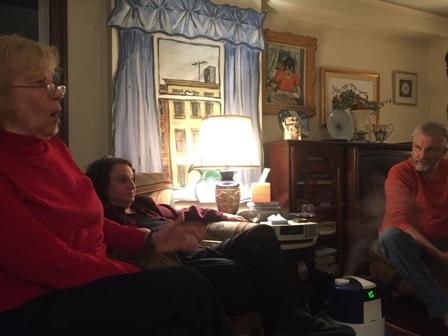
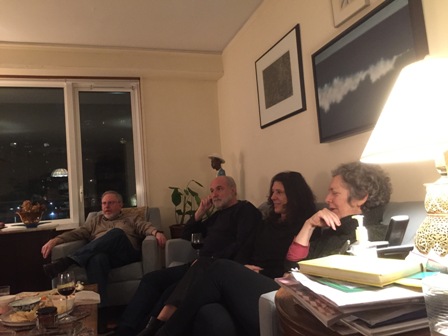
Grossman, David (Israeli), A Horse Walks Into A Bar, translated by Jessica Cohen, 2017, 208 pages, Knopf (Man Booker Prize) (Split reaction: folks either hated it and found turning each page a drudge OR thought the use of one extended stand-up set a brilliant device to bring out the psychologically destructive impact of the Holocaust on the 2nd generation.) (4/3/2018)
See Ferne Pearlstein’s documentary The Last Laugh on humor and the Holocaust. (previewed at 2016 Tribeca Film Festival)
Grossman, David (Israeli, repeat author), More Than I Love My Life, translated by Jessica Cohen, 290 pages, published in Hebrew in Israel, 2019, as Iti ha’chayim mesachek harbeh, English translation published 2021, Vintage (Longlisted for International Booker Prize) (In addition to the usual differing opinions on reading interest and character credibility, this book engendered our longest and most intense discussion as each member raised comparisons of the revealed Yugoslavia of Tito to the violent operation of past and present oppressive authoritarian dictatorships and the actual/potential impacts if traumas can extend across generations.) (2/18/2026)
Interview with the author about this book is on YouTube.
Israeli documentary Eva with English subtitles on the real women who inspired the book is also available on YouTube, in 4 parts of about 14 minutes each: Part 1; Part 2; Part 3; Part 4
Guterson, David, Snow Falling On Cedars (My review of the movie)
Guterson, David, East of the Mountains, 1999, 304 pages (Most felt this was a thin, didactic tale such that our enjoyable discussion was about criticizing its superficiality and simplistic style.) (9/2003)
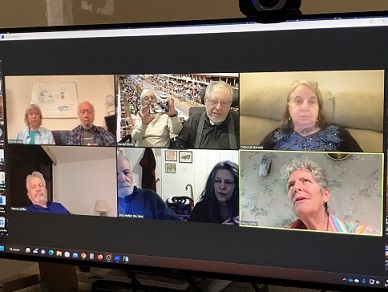 Gyasi, Yaa (Ghanaian-American), Transcendent Kingdom, 226 pages, 2020, Vintage (Shortlisted for Women’s -FKA Orange- Prize) (All who finished the book loved the considerations between religion and science through the art of this writing on the African immigrant experience in contrasting environments in the U.S.) (2/7/2023)
Recommended: a film by and starring Ghanian-American Nana Mensah that warmly touches on related themes: Queen of Glory (previewed at 2021 Tribeca Film Festival/ theatrical release by Film Movement)
Gyasi, Yaa (Ghanaian-American), Transcendent Kingdom, 226 pages, 2020, Vintage (Shortlisted for Women’s -FKA Orange- Prize) (All who finished the book loved the considerations between religion and science through the art of this writing on the African immigrant experience in contrasting environments in the U.S.) (2/7/2023)
Recommended: a film by and starring Ghanian-American Nana Mensah that warmly touches on related themes: Queen of Glory (previewed at 2021 Tribeca Film Festival/ theatrical release by Film Movement)
Habila, Helon (Nigerian), Measuring Time, 2007, 382 pages (Most thought the narrative style was flat storytelling, but we had a lively discussion about how much to extend this one family in a small village to a depressing window into Africa from pre-colonialism through the 1990’s.) (10/1/2007)
Haddon, Mark, The Curious Incident Of The Dog In The Night-Time, 2003, 240 pages, (Marvelous read and we were all impressed at the author's consistency in keeping the POV of an autistic teen and sympathy for characters caught in difficult situations, but the only discussion was about what emotional context means if you can't understand complex emotions.) (4/5/2005)
Halliday, Lisa, Asymmetry, 2018, 304 pages, Simon & Schuster (We had full attendance and split opinions for a rousing discussion, including: on what relationships were asymmetric into abuse, how the two sections did/did not fit together, how the writing either indicated literary sophistication or the immaturity of a debut novelist.)
Reading Group Guide (1/8/2019)
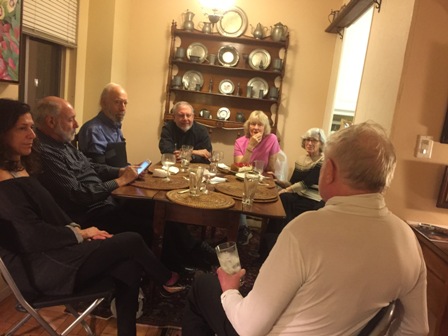 - of course we ordered in Indian food from Curry Hill
- of course we ordered in Indian food from Curry Hill
Hamid, Mohsin (Pakistani), The Reluctant Fundamentalist, 193 pages, 2007, Harcourt (Short-listed for Man Booker Prize/Anisfield-Wolf Book Award) (paperback/Kindle/unabridged audio) (Our smaller than usual group had a very mixed and somewhat dissatisfied reaction – about the main character, his actions, about his relation to his audience.) (6/6/2017)
Mira Nair’s 2012 film adaptation is on DVD, and streaming services.
Harding, Paul, Tinkers, 2009, 192 pages (Pulitzer Prize) (While we were all confused factually by the shifts between father and son, we admired the descriptive language—so much that we were convinced to never spend a winter in northern Maine—and debated the symbolism of clock repair.) (8/9/2011)
Harvey, Samantha (English), Orbital, 224 pages, Atlantic Monthly Press, 2023 (Booker Prize; Hawthornden Prize for English imaginative fiction; Cheltenham Festival InWords Literary Award; Shortlisted, Orwell Prize in Political Fiction and Ursula Le Guin Prize in imaginative fiction) paperback/Kindle/audiobook (While all the members were disappointed by the lack of a plot, we all appreciated her use of language and accurate descriptions.) (3/19/2025)
Hazzard, Shirley (Australian), Transit of Venus, 1980, 352 pages (Only two of us finished the book, the rest could barely make it to page 40 as they had zero interest in the tiresome characters, so we cancelled the session.) (3/1/2005)
Hazzard, Shirley (Australian), The Great Fire, 2003, 288 pages in hardcover, 326 pages in paperback (The majority hooted that it read like a lost post-colonial Graham Greene retread from 1952.) (3/1/2010)
Heaney, Seamus (translator), Beowulf, 2000, 215 pages (Most of the group had to be reluctantly convinced to read this atypical for us selection, but the marvelous translation led to a lively discussion of what the three monsters represented, the pagan acts vs. the Christian poet's viewpoint as well as the roles of the other storytellers, and the tenets of valor in a warrior culture.) (12/7/2004)
My movie review)
Hegi, Ursula, Stones from the River, 1994, 525 pages (Mixed vote, down the middle)
Hemon, Aleksandar (Bosnian-American), The Lazarus Project, 316 pages, 2008, Riverhead (Finalist, National Book and Book Critics Circle Awards; Michalski Prize for Literature; MacArthur Fellow) paperback/Kindle/audiobook (Though not all members wanted to finish the book, finding the bifurcated stories as annoying as its protagonist, others found the two inspired-by-history travels of traumatized Jewish immigrants in 1908 Chicago and a contemporary Bosnian-American writer like the author fertile for discussion on the linkages and themes, or at least the photographs, that were barely visible on Kindle.) (6/6/2023)
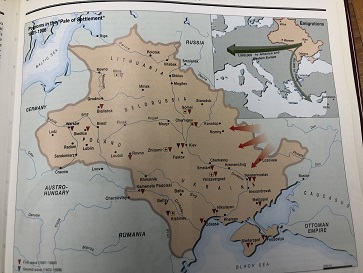 - from Barnavi, Eli, editor, Historical Atlas of the Jewish People (Schocken, 1994)
Nora Lee spent much of the past year on research about such Jewish immigrants, reported in a Zoom presentation on “Baron and Baroness de Hirsch and The Roots of Jewish American Farmers: Through the Life and Career of Leo Steckel” available on Video. (Bibliography is linked here.) Please help identify, and translate, Yiddish articles in The Jewish Farmer (דער אידישער פארמער) (probably 1912 – 1915) by Dr. Leo M. Steckel!
A recommended novel on the history behind the Sarajevo story is Ivo Andric’s The Bridge Over The Drina, translated from Serbo-Croatian by Lovett F. Edwards (1959, republished 1995 by Harvill Press)
- from Barnavi, Eli, editor, Historical Atlas of the Jewish People (Schocken, 1994)
Nora Lee spent much of the past year on research about such Jewish immigrants, reported in a Zoom presentation on “Baron and Baroness de Hirsch and The Roots of Jewish American Farmers: Through the Life and Career of Leo Steckel” available on Video. (Bibliography is linked here.) Please help identify, and translate, Yiddish articles in The Jewish Farmer (דער אידישער פארמער) (probably 1912 – 1915) by Dr. Leo M. Steckel!
A recommended novel on the history behind the Sarajevo story is Ivo Andric’s The Bridge Over The Drina, translated from Serbo-Croatian by Lovett F. Edwards (1959, republished 1995 by Harvill Press)
Hijuelos, Oscar, Our House in the Last World (His first novel)
Hoban, Russell, Riddley Walker, originally published in 1980; 1998 edition published by Indiana University Press has useful glossary and afterword, 256 pages (A fascinating post-apocalyptic read and essential discussion -- tip, it helps to read tough but phonetic sentences out loud! -- that even though it comes out of 1970's Cold War/Anti-Nuke tensions still has powerfully provocative points about religion, politics, civilization, technology, violence, society, and the power of storytellers and artists. And something about dogs, but not much about women.) (7/5/2005)
Hoffman, Alice, Practical Magic (Much better and more sophisticated than the movie, but heck the movie does have Sandra Bullock and Aidan Quinn)
Hosseini, Khaled, The Kite Runner, 2003, 372 pages (While there's some one-dimensional characters, plot coincidences and autobiographical projections that betray this as a first novel, all were caught up in the gripping story from a culture we don't get to see this close up, of (primarily male) Afghanistan before and during the Taliban. Some saw this as allegorical about the country in general; others saw a religious tale of sin and redemption.) (11/9/2004)
Houellebecq, Michel (French), Submission, published in France 2015, English translation by Lorin Stein published 2016, 256 pages, Picador, available in paperback/Kindle (The provocative novel spurred a vigorous discussion on interpretations of the satirical and serious elements of the plot and protagonist development.) (3/7/2022)
The author satirizes himself in the 2014 film The Kidnapping of Michel Houellebecq available through Kino Lorber.
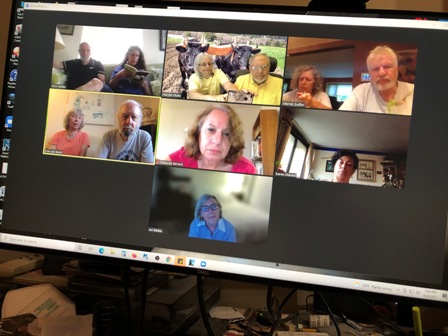
Hua, Yu (Chinese), To Live, originally published in 1993, translated into English by Michael Berry, 256 pages, 2003, Anchor, included in the National Endowment for the Arts Big Read Program: “Yu Hua is one of China's most well-known authors and his bestselling novel, To Live, has been named one of China's ten most influential books of the last decade.” (All appreciated reading the book, but were struck by the sadness and the enduring difficulties of 20th century rural life through the eyes of a farmer, under, ironically, every political force, whose accuracy was debated for then and how much it has changed.) (7/28/2021)
Film adaptation by Zhang Yimou in 1994 is available on expensive DVD
A New Old Play (Jiao Ma Tang Hui), 2021 fiction film, imaginatively covers the similar tumultuous 50 years in China (1930s – 1980s), with a more satiric tone as through the eyes and theatrical mode of an urban sophisticate, writer/director/production designer Qiu Jiongjiong’s grandfather, the Sichuan opera clown-role actor Qiu Fu-xin.
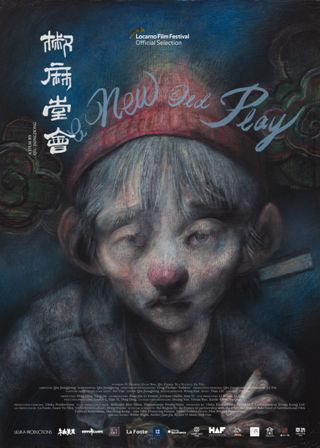 (seen at 2022 First Look Festival at Museum of the Moving Image/ courtesy of Icarus/dGenerate Films) (3/20/2022)
(seen at 2022 First Look Festival at Museum of the Moving Image/ courtesy of Icarus/dGenerate Films) (3/20/2022)
Huxley, Aldous, Brave New World, 288 pages, 1932; Most of the group also read the 2005 foreword by Christopher Hitchens and his 1958 essay collection Brave New World Revisited, 144 pages. (We were impressed that besides his of-his-time-and-class snobbery, sexism, Malthusism, neglect of environmental degradation and expectation of power to government rather than corporations, he was amazingly prescient about social control through bread and circuses.) (3/4/2014)
Hynes, James (Irish), Wild Colonial Boy
Ibsen, Henrik, A Doll House
Ilf, Ilya and Petrov, Evgeny (Russian), The Twelve Chairs, 1928, 2011 Northwestern University Press edition is a new translation by Anne O. Fisher, 480 pages in paperback. (Not on Kindle.) The earlier British translation by John C. Richardson is still around as a used paperback and is available as a free download. (This was the basis for the 1970 Mel Brooks film, which had a different ending.) (After checking out the specific context of U.S.S.R. history to understand the brief window that allowed these funny satirists to publish, we discussed the particulars, that some thought dragged the story out for a contemporary reader, vs. the picaresque universality of the clever con man manipulating any bureaucratic system.) (3/6/2012)
Ishiguro, Kazuo (English, Nobel Winner), The Remains of the Day
Ishiguro, Kazuo, Klara and the Sun, 321 pages, 2021, Knopf, Faber British paperback available; Random House large print paperback available; American Vintage paperback release on March 1; on Kindle (Booker Prize nominee; NYT Notable Book; a WaPo Best Book of Year; longlisted for Am Library Assoc Carnegie Medal) (With different interpretations, everybody really liked this novel, with a very good discussion via Zoom about this science-fictional dystopian society, and the role of “Artificial Friends” in the book, in this world, and in our world now and in the future.) (2/1/2022)
An entertaining German “rom com” on a similar theme: I’m Your Man (Ich Bin Dein Mensch), directed and co-written by Maria Schrader (2021) Available on Hulu and On Demand
German director/co-writer Sandra Wollner’s The Trouble with Being Born (2020) imagines a pedophile having such a “child” and incest implications with its next “owner”, a film deemed so disturbing it was banned from some film festivals.
Ishiguro, Kazuo, Never Let Me Go, 288 pages, 2006, Vintage (NY Times, LA Times, and Kirkus Review “Best Book of 21st Century”) (All the members participating read and liked the selection with a lively discussion of the substantive issues the author raises about this society’s medical and scientific ethics and eugenics.) (11/19/2025)
The 2010 film adaptation written by Alex Garland and directed by Mark Romanek is beautiful, well-acted, faithful with a bit of added details for visual emphases. It is available to stream, rent, or buy on several platforms.
Jacobson, Howard (British), The Finkler Question, 2010, 320 pages, Bloomsbury USA (Man Booker Prize winner) (While we all enjoyed the excuse to have a repast of Ashkenazi take-out (despite that Katz's Delicatessen wouldn't deliver after 6 pm), a couple of folks were turned off by three unsympathetic men kvetching and couldn't even finish reading it, a couple found it laugh out loud funny, while others appreciated it as a satire of British Jews. I think it referred to an article I couldn't find the full text of: Tom Stoppard's "Another Country," Sunday Telegraph Magazine, (London) 10 October 1999: 14-19, 20-1; I've also seen the article cited as: "On Turning Out To Be Jewish," and "Tom Stoppard Discloses His Past", from when it first appeared in the premiere issue earlier that year of Talk Magazine.) (1/5/2011)
Barney’s Version the book, and to a lesser extent the movie, as discussed in my commentary on the Jewish women, is a lot like a Canadian Jewish version.
Jen, Gish, Mona in the Promised Land, 1996, 304 pages (Mixed vote between those of us who thought it a witty take on ethnic identity and those who thought it a glib rehash of coming-of-age in suburbia in the late '60's.)
Jiles, Paulette (American), News of the World, 240 pages, 2016 (National Book Award Finalist) (All enjoyed the book and admired how well-researched and (mostly) 3-D the period characters were, even feeling guilty pleasure over the Hollywood epilogue.) (7/11/2017)
Film adaptation (2020), directed and co-written by Paul Greengrass, is more optimistic and looks like an updated tribute to John Ford. (12/16/2020)
Jin, Ha, Waiting, 2000, 320 pages (Is it about universal humans or particularistic about Chinese? And are these Chinese particularly Communist or reflective of traditional Chinese culture? Or is this more of a analogue for modern Chinese history?)
Johnson, Adam, The Orphan Master’s Son, 464 pages, 2012 (Pulitzer Prize) (Though some objected to the degree of violence, readability, and if this was old-fashioned propaganda, we had a lively discussion of fact vs. fiction vs. realistic imagining of how human beings would survive in a contemporary dystopian totalitarian society.) (1/7/2014)
Documentaries I recommend on North Korea: Beyond Utopia, Kimjongilia; Yodok Stories; The Red Chapel; and Camp 14: Total Control Zone, that I briefly reviewed at 2013 Death & Politics at Human Rights Watch Film Fest at Film Society of Lincoln Center.
Jones, Edward P., The Known World, 2003, 432 pages (Most felt this was a fascinating recreation of the full range of complexity of the ante-bellum South, where the acceptance of owning other human beings complicates issues of race, sex and class, though this docudrama has a long set-up to get to the suddenly fast-paced surprising conclusion) (10/5/2004)
Joyce, James (Irish), Portrait of the Artist as a Young Man (This was one of our few attempts at a classic - and not everyone read it!)
Karunatilaka, Shehan (Sri Lankan), The Seven Moons of Maali Almeida, 400 pages, 2022, Penguin (Booker Prize) paperback/Kindle/audiobook (Many of the members disliked the book’s characters, plot confusion, and violence so much that they did not finish reading it; the others appreciated the very cynical, particularly gay, insights into a long-lasting, complicated genocidal civil war amidst class, religious, and cultural conflicts.) (4/11/2023)
Kashua, Sayed (Palestinian Israeli), Let It Be Morning (translated by Miriam Schlesinger), 2004, 271 pages (We discussed if it was a satire or just satirical elements in encapsulating the ironic future of Israel/Palestine through the lens of an Arab village, north of Tel Aviv, full of believable characters whose politics reflect their personalities and relationships since birth.) (1/5/2010)
Let It Be Morning the film adaptation written and directed by Eran Kolirin (The Band’s Visit) is tone-perfect and wonderfully cast with “Palestinian citizens of Israel”. There of course has been controversy: the actors objected: "We cannot ignore the contradiction of the film's entry into Cannes [Film Festival] under the label of an ‘Israeli film’ when Israel continues to carry its decades-long colonial campaign of ethnic cleansing, expulsion, and apartheid against us—the Palestinian people." Conservative Jewish press objected that an “anti-Zionist” film won the Best Picture Ophir Award, so is automatically Israel’s submission for 2022 Foreign Language Oscar. (Opening Night at 2021 Other Israel Film Festival) (10/28/2021)
Optional additional reading was: Dancing Arabs (translated by Miriam Schlesinger), 2002, 227 pages. He also wrote wry newspaper columns about life as an Arab in Israel – until he fled the pressures to teach in the U.S. My review of the 2009 Other Israel Film Festival included Forever Scared, a documentary about the author.
Post-2014 Gaza war update.
My review of his filmed adaptation of three of his books: A Borrowed Identity (Dancing Arabs aka Second Son) (2014) (So, nu: my commentary on the Jewish women.)
Kawabata, Yasunari (Japanese), Snow Country (Knowledge of Zen poetry and Japanese culture would help) (9/1994)
Kawakami, Mieko (Japanese), All The Lovers In The Night, translated by Sam Bett and David Boyd, 224 pages, 2022, Europa Editions (author recommended by Haruki Murakami; Finalist, National Book Critics Circle Award; A Best Book of the Year: Oprah Daily, TIME, WaPo, Publishers Weekly, Lit Hub) (paperback/Kindle/audiobook) (Mixed reaction, including from our two new members, as we debated whether the female protagonist was a problematic character or is a symbolic criticism of the oppressed role of women in Japanese society.) (10/20/2024)
For an explicitly critical perspective on women in Japan see Shiori Ito’s autobiographical documentary Black Box Diaries
Ema Ryan Yamazaki’s short film Instruments of a Beating Heart (available as a NY Times Op- Doc) is a window on the conformity pressures on Japanese girls from the first grade. It is an excerpt of her feature documentary The Making of a Japanese 『小学校~それは小さな社会~』(Shogakko ~Sore wa Chisana Shakai~) (as seen in 2024 Japan Cuts: Festival of New Japanese Film at Japan Society)
Khadra, Yasmina (nom de plume for Algerian army officer Mohamed Moulessehoul), The Attack (translated from the French by John Cullen), 2006, 272 pages (We had a lively discussion of just how didactic and one-dimensional is this bleak view of Israeli/Arab/Palestinian relations, especially the opaque central couple.) (4/6/2009)
My review of the film version (So, nu: my commentary on the Jewish woman.) (6/25/2013)
King, Lily, The English Teacher, 2005, 256 pages (Majority, but not all, disliked it, including one who had read Tess of the D'Urbervilles which is used like Mrs. Dalloway is in The Hours, some disliked the characters, some the writing style, some the plot credibility of the central focus on PTSD from rape or the conclusion.) (1/7/2008)
Kingsolver, Barbara, Demon Copperhead, 556 pages, 2022, Harper, Kindle/audio unabridged/large print and international edition paperback (Pulitzer, Oprah’s Book Club, NYT and WaPo Best Book; Shortlisted, Women’s Prize for Fiction) (With all but two finishing the summer-length read, all were impressed by her consistent first-person adaptation of Charles Dickens’ David Copperfield with a large ensemble of distinctive, 21st Century Appalachian characters within an involving, page-turner of a socially and politically conscious story.) (9/13/2023)
Sean Dunne’s powerful documentary Oxyana was one of the first to deal with the oxy crisis, focused on Appalachia, that I briefly reviewed in 2013 Documentaries at Tribeca Film Festival.
The most recent filmed version of Dickens' original book is The Personal History of David Copperfield, adapted by Armando Iannucci, known for his biting satires
A non-fiction book about reactions to the poor in England around Dickens' time is by an eminent historian, who shares the conservative politics of her husband Irving Kristol and son William Kristol: Himmelfarb, Gertrude, Poverty and Compassion: The Moral Imagination of the Late Victorians, Vintage, 475 pages, 1991
Kingsolver, Barbara, Pigs in Heaven (This is actually a follow-up to The Bean Tree)
Canadian TV limited fiction series Little Bird (2023) follows the impact of the history of government forced separation of indigenous children and out-adoption. Related issues are investigated in the documentary Sugarcane.
Kingsolver, Barbara, The Poisonwood Bible, 1999, 566 pages (I missed the meeting but all readers were really moved and entertained by the creative writing perspectives of unique characters, though they get a bit stick-figurey towards the end. This beat the sophomore jinx we've experienced of reading books by the same author.) (4/3/2001)
Kinsella, W.K., The Iowa Baseball Confederacy (3/1993) (One of my all time favorite books -- hard to believe that Richard Greenberg didn't read this before writing Take Me Out)
Kirn, Walter, Up in the Air, 2002, 320 pages (Most felt it was a static one-note with no catharsis or interesting characters, even though it does nail business consultants.) (3/9/2004) (Jason Reitman's film adaptation is much better because he included the reactions of real fired people and women who tell off the main character.) (12/10/2009)
Köhlmeier, Michael (translated from the German by Ruth Martin), Two Gentlemen on the Beach, 2016, 238 pages, Haus Publishing (While some members had researched the biographical facts of Charlie Chaplin and Winston Churchill to compare what in the book was true and/or feasible, our discussion mostly focused on these two men’s reactions to the rise of Hitler and critical roles in rousing the U.S. and the U.K. to defend democracy against him.) (4/2/2019)
Krauss, Nicole (American), The History of Love, 2005, 272 pages (One of our favorites! The discussion started before the meeting time and, unusually, continued through our (Eastern European) take-out dinner. Several members immediately reread the book and we all enjoyed checking the plot twists, but also the themes of love and survival, words and translations and magic realism. And yes, there is a real Universal Edibility Test.) (1/9/2007)
Krauss, Nicole, Man Walks Into A Room, 2002, 256 pages (Most felt the central character was too unsympathetic to care about and that the plot became too picaresque, but we liked seeing emerge in this her first novel the author's talent for giving different characters' unique voices and we enjoyed discussing issues of memory and identity.)
Similar issues are raised in the possibly faux doc Unknown White Male and the real, but less interesting, Thomas Lien's Hunting Down Memory, seen at the 2009 DocuWeek.) (3/6/2007)
Krauss, Nicole, Great House, 2010, 289 pages (National Book Award Finalist, ABA Indies Choice Honor Award, Anisfield-Wolf Award, Shortlisted for the Orange Prize) (All felt it was the weakest of her books to follow a desk through 20th century Jewish history as too symbolic a gimmick.) (11/6/2013)
Krauss, Nicole, Forest Dark, 2017, 305 pages, Harper (A best book of the year by: NYT, Pub Weekly, Globe and Mail) (Almost all of us were disappointed! In the characters, the plot, weak use of alternative realities mixed with actual people past and present, and whatever the themes were.) (3/6/2018)
Kundera, Milan, The Unbearable Lightness of Being (6/6/1995)
Kundera, Milan (Czech), The Unbearable Lightness of Being, translated by Michael Henry Heim, 320 pages, 1984, Harper (repeat selection in memoriam) (While original group members didn’t remember the reading, we again found that nowadays a classic 20th century novel doesn’t hold up to its reputation due to sex, philosophy, and annoying narrator, but we were led to discuss the politics of fate and individual responsibility.) (10/10/2023)
Kunzru, Hari, (British-Kashmiri), Transmission, 2004, 288 pages (A very funny, light-read, globalization satire that some thought was very bitter, with no grown-ups, but all well-hit targets.) (9/10/2007)
Kunzru, Hari, (British-Kashmiri), The Impressionist, 2002, 465 pages (Even without sympathetic characters, its broad satirical scope is impressive, with marvelously outrageous vignettes, for its attack on the British colonial empire and the damaging legacy of racial and cultural identity confused by context and perception.) (9/14/2009)
Kurkov, Andrey (Ukrainian), Grey Bees, translated by Boris Dralyuk, 378 pages, English translation 2022/originally published 2020, Deep Vellum Publishing, paperback/Kindle (While only a small number could attend, we all loved the book, and enjoyed considering the symbols and metaphors within a story very relevant about the people, who we tried to figure out, as they got caught within the Russian invasion of Eastern Ukraine and take-over of Crimea.) (10/11/2022)
Kyung-sook, Shin (Korean), Please Look After Mom, 2011, 272 pages (Man Asian Literary Prize) (With each of us finding different strengths and themes in the particular chapter’s points-of-view, we all admired how a book so very culturally specific could still be universal about mothers and children.) (12/11/2012)
Beleaguered mothers have also been powerful recurring images in recent Korean films, including Secret Sunshine (Milyang).
Lahiri, Jhumpa, The Namesake , 2003, 304 pages (Most of the group were fascinated by the generational saga of Bengali immigrants to the U.S., though the scenes worked better as a series of sharp short stories than a novel overall. Gogol's The Overcoat has some sort of thematic and structural link that we didn't get because we didn't read it.) (2/1/2005) (I was disappointed by the film adaptation.) For other novels reflective of the Immigrant Experience in America:
classics, not all semi-autobiographical and newer books, not all fiction or for adults.
Lawhon, Ariel (American), The Frozen River, 448 pages, 2023, Doubleday (Good Morning America Book Club; an NPR Book of Year) available in paperback/Kindle/audio book) (Most of the group enjoyed the read, while learning about late 18th century Massachusetts lives and justice, two members even visiting Hallowell, Maine, but all conceded it was more of a feminist romance novel, movie fodder than great literature.) (7/17/2025)
This is based on a Pulitzer Prize-winning book that is one of my long-time History Reading Group’s all-time favorites for the parallel stories it tells about the midwife with the discovery and annotation of her diary by Laurel Thatcher Ulrich, A Midwife’s Tale: The Life of Martha Ballard, Based on Her Diary, 1785-1812, 500 pages including extensive footnotes, Knopf, 1990 (paperback/kindle/audio book). History teachers have also re-constructed online Martha Ballard’s Diary as a case study for using original documents. It is also the basis for a 1997 PBS American Experienceepisode (now only available on DVD), with Ulrich as consultant, script collaborator on the docu-drama, and narrator (she adds in more about the real lives than the novelist’s Afterword does), accompanied by a detailed website about the original diary and this episode.
Laxness, Halldόr (Icelandic), Independent People, translated by J.A. Thompson, 509 pages, Vintage International, Originally published in 1946, Introduction by Brad Leithauser to the 1997/2009 editions, from his The New York Review of Books piece “A Small Country’s Great Book” – but it is full of spoilers. (Nobel Prize) (Group had a mixed reaction due to the unsympathetic main character and unrelenting misery, but some admired the Marxian economic analysis and descriptive language.)
Recommended film accompaniment: Grímur Hákonarson’s Rams (Hrútar) (2015)
Le Clézio, J.M.G. (French) (Nobel Prize winner), Onitsha (translated by Alison Anderson) 1991, 206 pages (The dream-like linking of the Nile and Niger Rivers through African history lifted this above his bitter childhood memories of British colonial racism as the empire ran aground, symbolically and in fact.) (11/2/2009)
Lee, Chang-rae (Korean-American), The Native Speaker
Lee, Chang-rae, Aloft, 2004, 384 pages (While we appreciated amusing vignettes of Queens and Long Island types, almost all were disappointed in this Updike imitation with an inauthentic sounding and feeling first person narration by an unappealing guy with the titular attitude to his life. A big let down from his debut above that we really liked.) (9/11/2005)
Lee, Min Jin (Korean-American), Pachinko, 512 pages, 2017, Grand Central Publishing (While in the readable, melodramatic tradition of a multi-generation family epic, we appreciated the detailed social and political insight into the treatment of Korean/Christian minority by the Japanese over the 20th century.) (National Book Award/Dayton Literary Peace Prize Finalist; NY Times/USA Today/BBC/NYPL Top 10 Book of the Year; Medici Book Club Prize) (1/15/2020)
Adapted into a 2022 mini-series on AppleTV+
Lethem, Jonathan, Motherless Brooklyn, 1999, 311 pages (We all fell in love with the language of this very NY book, and especially with the protagonist, a Tourette's-afflicted detective.) (1/2/2001) (NB: Edward Norton’s film version is inspired by this book, but combines the story with Robert Caro’s The Power Broker.)
Lethem, Jonathan, The Fortress of Solitude, 2003, 528 pages (The bare quorum who read it appreciated a white-boy's changing language to experience and reflect on the ambiguous legacy of Brooklyn gentrification, from realism to magic realism.) (9/7/2010)
Lethem, Jonathan, Dissident Gardens, 2013, 384 pages (We were so enthused to read about Queens, Lower East Side, and leftist politics we were familiar, from an author whose earlier work we admired, that we read it before it was available in paperback, so we were disappointed at the lack of in-depth characterizations in superficial, even snarky, takes on unsympathetic people.) (2/4/2014)
Lethem, Jonathan, Gun, With Occasional Music, 2003, 284 pages, Houghton Mifflin Harcourt (debut novel) (Mixed reaction to this easy read that blended dystopian sci fi future with heavy-handed Dashiell Hammett language and underworld corruption plot) (2/5/2019)
Levy, Andrea, Small Island , 2004, 448 pages (All enjoyed this perceptive examination of the fall of the British Empire from the perspective of male and female, black, white and mixed race colonials and the Mother Country.) (5/11/2005)
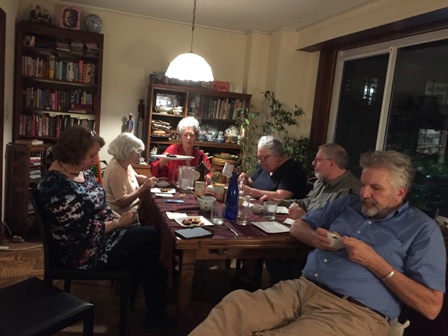 -- Enjoying a period repast of frank & beans, mac & cheese, pudding & Jell-O & fruit cup
-- Enjoying a period repast of frank & beans, mac & cheese, pudding & Jell-O & fruit cup
Lewis, Sinclair (American), It Can’t Happen Here, 1935 (but a Top 10 seller on Amazon this year), 499 pages, Signet 2014 reprint includes Introduction by Prof. Michael Meyer and Afterword by Prof. Gary Scharnhorst) (We were all impressed how well it still worked both as a bitter satire of applying Hitler’s and Huey Long’s appropriation of democracy for fascism to the U.S., with striking prescience for the rise of another right-wing populist president in 2016.) (5/2/2017)
Lightman, Alan, The Diagnosis, 370 pages (With one dissent by the scientist in our group, the rest thought the writing pedestrian, the characters one-note and the meaning either cliche or confusing, other than a few vivid scenes that felt like separate short stories) (6/11/2002)
Lively, Penelope (British), Moon Tiger, 1988, 208 pages, also available in Kindle/Nook/unabridged audio (Booker Prize) (Mixed reaction – folks who liked the lead character as an exemplar of an unusual career woman facing down a colorful portrait of the British declining empire through 20th century tended to like the book; those who found her cranky and annoying, as well as the plotting inconsistent, didn’t.) (2/7/2012)
Livesey, Margot (Scottish), The Missing World, 2000, 336 pages (We mostly parsed why this manipulatively plotted book, with its static, unappealing, narcissistic characters, was acclaimed, and reminisced about other books on this list we had preferred reading.) (The possibly faux doc Unknown White Male came to a different conclusion about an amnesiac's second chances.) (5/11/2009)
Llosa, Mario Vargas (Peruvian, Nobel Prize winner), Aunt Julia and the Scriptwriter, originally published in English in 1982, translation by Helen R. Lane, 384 pages (After confessing it took us a bit ways in to figure out the author's witty style, we honed in on how the two titular people affectionately made this a comic coming-of-age story.) (2/8/2011)
Lodge, David, Therapy, 1995, 321 pages (Veddy English - is it a "guy" or "chick" book?)
Reading Paulo Coelho’s spiritually too-serious The Pilgrimage (to Santiago de Compostela) puts it in context for comparison.
Lorca, Frederico, The House of Bernarda Alba (Play, whose translations vary in quality)
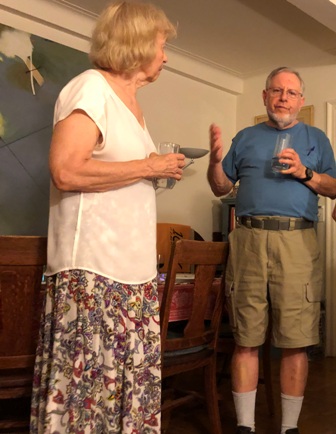
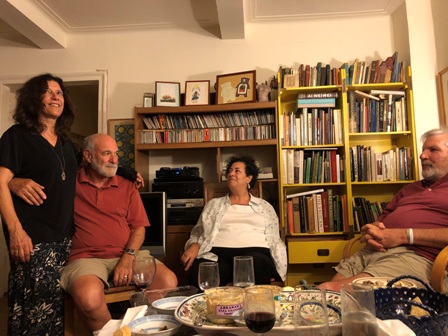 - On the Upper West Side, lingering to still talk about the children in the book.
- On the Upper West Side, lingering to still talk about the children in the book.
Luiselli, Valeria (Mexican), Lost Children Archive, 401 pages, 2019, Random House Knopf (While most felt the author was ostentatiously showing off her intellectual knowledge in the first half, we got caught up in the credible changes of voices and perspectives that were insightful, even as she went from depressing reality to magic realism. And we’re still not sure we really understand the difference between a “documentarian” and a “documentarist”, which is too bad because I would like to be able to distinguish those in my film criticism.) (7/16/2019)
Recommended films about “The Beast” train taking migrants through Mexico to the U.S. border, featured in the Elegies for Lost Children book-within-a-book: Rebecca Cammisa’s documentary Which Way Home, which I briefly reviewed at the 2009 Tribeca Film Festival, and the well-researched fiction film the same year Sin Nombre, directed by Cary Joji Fukunaga.
Lynch, Jim, The Highest Tide, 2005, 272 pages (An enjoyable and educational read around Earth Day with both colorful human and marine characters, leading to discussions about the narrator and if there was metaphor or satire, in addition to surprising parallels with the TV series Surface.) (5/1/2007)
Machado de Assis, Joaquim Maria (Brazilian), The Posthumous Memoirs of Brás Cubas, new translation and notes edited by Flora Thomson-DeVeaux issued in paperback and Kindle, released as a Penguin Classic on June 2, 2020, Foreword by Dave Eggers, 368 pages, originally published in 1881 in Portuguese as Memórias Póstumas de Brás Cubas (Mixed reaction between those who were too annoyed that the protagonist was a shallow 1%’er, while others saw him as pointed, classic satire.) (10/6/2020)
MacLeod, Alistair (Canadian), No Great Mischief, 1999, 283 pages (Impac Dublin Literary Award winner) (With a few gripes about repetition, most were struck by the powerful evocation of family tribal history and concomitant obligations, particularly vividly described between men and about death – even though no one wanted to listen to my large collection of traditional Cape Breton and Scottish fiddle music and laments.) (4/7/2008)
Mahfouz, Naguib (Egyptian), Palace Walk, originally published in Arabic in 1956, in English in 1990, 498 pages (Made us wonder if the concept of hypocrisy is culturally defined. I also read the remaining two books in the trilogy to satisfy my curiosity as to what happens to the characters; this first is the best written and most subtle.)
Mallon, Thomas, Henry and Clara, 1995 (8/14/1997)
Malouf, David (Australian), An Imaginary Life , 1978, 154 pages (What we didn't know that we didn't know about Ovid meets Truffaut's L'enfant Sauvage in beautiful wordplay.)
Malouf, David, The Great World, 1991, 330 pages in hardcover, 340 pages in paperback (While not quite a quorum read it in the heat of the summer that also distracted our discussion, we admired the author's sympathy for three generations affected by war, particularly those sharing PTSD over decades. However, we protest the poor quality of Vintage's typeface selection and printing that made it that much harder to read.) (7/11/2010)
Malouf, David, Ransom, 240 pages, 2010 (While almost all of us neglected to really read Book XXIV of The Iliad for background context, we were impressed how those legendary figures were brought to such human life, including capricious gods, with beautiful language and added midrashic insight into a universal, and ongoing, story of war and grief.) (11/1/2011)
Mansbach, Adam, The Golem of Brooklyn, 259 pages, 2023, One World (paperback/Kindle/Random House audiobook read by Danny Hoch) (Surprisingly, a very funny, very Jewish book led to an extended discussion on the interpretation of the titular character post-October 7, 2023.) (5/13/2024)
A member of the group recommends this interview with the author.
The Larry David TV show referenced in the book is Curb Your Enthusiasm.
Márai, Sándor (Hungarian), Casanova in Bolzano, originally published in 1940, 2004 translation by George Szirtes, 294 pages (While half our group was daunted by the book and didn’t show up, the rest had a tremendously lively discussion about the characters and what metaphors they represented – were they power/order vs. hedonism/ego-centricity vs. love/beauty?-- in general and in the context of European politics when the book was written, as prescient post-modern deconstruction or satire.) (6/3/2008)
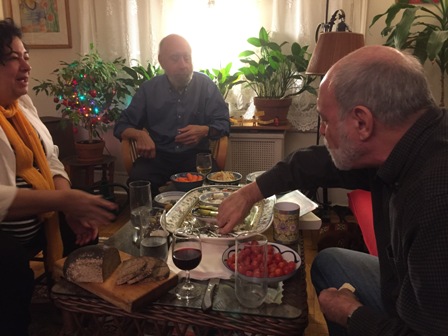 Russian herring and black bread prologue:
Russian herring and black bread prologue:
Marra, Anthony (American), The Tsar of Love and Techno - Stories, 2015, 384 pages, Hogarth (American Academy of Arts and Letters Rosenthal Family Foundation Prize; National Book Critics Circle Award Finalist; Kirkus Reviews Best Fiction Books of 2015) (All loved it! We loved the language, the linked story structure, the cynical capturing of decades of corrupt Russian society from Stalinism through glasnost to entrepreneurial capitalism, and the ambiguous ending for group discussion.) (2/7/2017)
Martel, Yann (Canadian), Life of Pi, 2002, 348 pages (Lively discussion -- particularly when we discovered that there were two different versions of the paperback editions that changed a crucial paragraph--according to the simplistic "reading group notes" at the end--as we tried to figure out if the author was really dissing religion in "telling the better story" or intending the book to be taken metaphorically straight. Much disagreement as to whether it was about evil vs. religion or about nature vs. civilization or if those were the same things.) (10/7/2003)
Martin, Valerie, Property, 2003, 208 pages (Through the eyes of a surprisingly unsympathetic yet fascinatingly consistent protagonist, a searing look at how complicity in a morally corrupt system--here slavery--corrupts the oppressor almost as much as it damages the victim) (8/3/2004)
Matar, Hisham (Libyan), In the Country of Men, 272 pages, 2006 (Commonwealth Writers' Prize Best First Book award for Europe and South Asia and shortlisted Man Booker Prize) (Not only were we impressed by the language and the consistency of a child’s point of view of complicated parents, we were struck by the portrait of a dysfunctional society through protesters against Gaddafi and the sensitive sympathy for oppressed Arab Muslim women.) (5/6/2014)
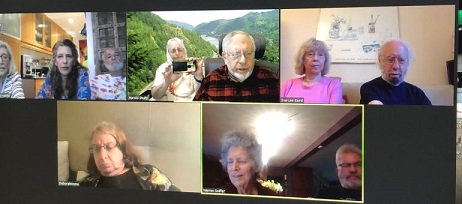
Matios, Maria (Ukrainian), Sweet Darusya: A Tale of Two Villages, translated by Michael Nayden and Olha Tytarenko, 159 or 224 pages, English translation published 2019, Spuyten Duyvil Publishing (“Book of the Year 2004" prize and Taras Shevchenko National Award in 2005) (While many attributed their discomfort with the book to the translation, especially in the paternalistic portrayal of peasants, there was sympathy for Carpathian villagers beset by generations of violence from shifting armies and peer pressures.) (5/16/2022)
Matthiessen, Peter (RIP), At Play in the Fields of the Lord, 373 pages, 1965 (A mixed vote whether or not were the stereotypes the missionaries and “heroes” characters, even though one was a “Native American” seeking his indigenous roots, and the hallucinogenic language and jungle descriptions.) (6/3/2014)
Mawer, Simon (British), The Glass Room, 2009, 406 pages (Mixed reaction, but we managed to get around the “telenovela” plot coincidences to discuss the significance of inter-war and post-war cosmopolitan intellectuals, as symbolized by that house.) (12/4/2018)
McBride, James, Deacon King Kong, 383 pages, 2020, Riverhead (Kindle/paperback/unabridged audio) (Anisfield-Wolf Book Award; Gotham Book Prize; Oprah's Book Club; Top 10 Book of Year: NYT, EW, Time, Barack Obama; WaPo Notable Novel) (An enjoyable read by all as a satirical fable with distinctive, diverse characters of the ethnic succession in and around a NYC Housing Authority project in Brooklyn a lot like Red Hook. (1/4/2022)
McBride, James, The Heaven and Earth Grocery Store, 400 pages, 2023, Riverhead (NYT Notable Book; Best Book of Year: NPR’s Fresh Air, WaPo, NYer, Time; One of Barack Obama's Favorite Books of Year) (paperback/Kindle/Penguin audiobook read by Dominic Hoffman) (Most enjoyed reading about the realistically imagined segregated Pennsylvania town of the early 20th century, even if the connections and divisions among all the different ethnic, religious, and social groups (Jews, African-Americans, Germans, Poles) were resolved through magic realism.) (7/23/2024)
McCann, Colum, Apeirogon, 480 pages, 2020, Random House (Finalist; Dublin Literary Award; Longlisted, Booker Prize; Winner, National Jewish Book Award; Best Book of Year: The Independent, Library Journal, NYPL) (All agreed this was one of our favorite reads – not as much a novel as an insightful juxtaposition of 1,001 tales to find the basis for possible peace in Israel/Palestine, made even more significant read after October 7, 2023. (2/20/2024)
We gradually realized as we read that the protagonists are Real Heroes, active in Combatants for Peace (at least two members have already sent donations). Several documentaries have been made about the work they and related organizations do, in the past Within the Eye of the Storm (2012), to many audiences over many years. They are also active in The Parents Circle, aka Israeli and Palestinian Bereaved Families, the subject of The Narrow Bridge (2022). (This is just a selection of related documentaries and their talks on YouTube.)
Activists in these organizations are continuing post-October 7.
The book’s protagonists, and more, younger activists are interviewed in the 2024 documentary, with post-October 7, 2023 epilogue: The Other.
McCann, Colum, Let the Great World Spin, 2009, 368 pages in hardcover, 400 pages in paperback (While some disagreed with the author that it was a 9/11 book, all agreed it well evoked diverse all-borough voices in NYC of the 1970's, and admired his use of the impact of Pettit's high-wire walk more for kismet than coincidence.) (6/7/2010) (The title is taken from Tennyson's "Locksley Hall": "Not in vain the distance beacons. Forward, forward let us range,/Let the great world spin for ever down the ringing grooves of change.")
McCarthy, Cormac, All The Pretty Horses
McCarthy, Cormac, The Crossing (Mixed vote on it being pretentious and redux.)
McCarthy, Cormac, The Road, 2006, 304 pages (selected by both Oprah and the Pulitzer Prize) (Though all appreciated the language, story-telling and portrait of paternal devotion, mixed vote on the author’s continuing obsession with the warrior mensch, as well as credibility about science, individualistic vs. social human nature and the meaning of it all.) (6/11/2007) (The movie adaptation expands on the mystery of the wife/mother, but is grimly faithful.)
McCarthy, Tom (British), Remainder, 2006, 308 pages (Most of the group was so put off by the central character's unappealing lack of morality and empathy ---let alone no one wanting to have liver for dinner--that we barely got around to issues of humanity, control, uncertainty, and memory.) (11/15/2010)
It reminded me of the fictional artist in Synecdoche, New York and the real, brain-injured mastermind of his own village of dolls in Marwencol.
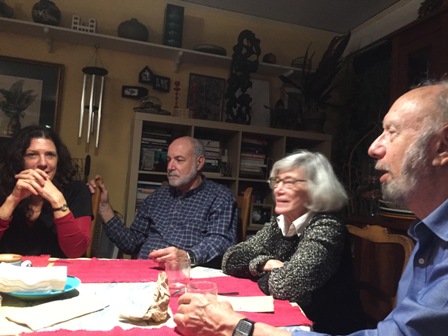
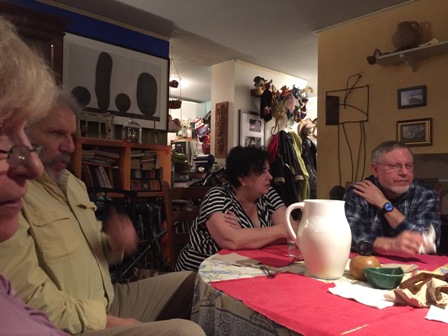 - Our first dinner discussion on Bleecker Street
- Our first dinner discussion on Bleecker Street
McEnery, Lisa (Irish), The Glorious Heresies, 418 pages, 2016, Tim Duggan Books (Baileys Women's Prize; Desmond Elliott Prize; Shortlisted for Best Newcomer at the Irish Book Awards; Longlisted for International Dylan Thomas Prize; The Irish Times March Book of the Month) (Most were struck by the writer’s sympathy for male and female characters trapped by poverty, addictions, Catholic Church control, absence of government services, and any moral authority other than loyalty.)
McDermott, Alice, Charming Billy, 1998, 280 pages (Are these Irish-American stereotypes or an evocative portrait of a family network that enables alcoholism and self-deluding romanticism? They missed the chance to cast Richard Harris in a movie version – maybe Aiden Quinn is old enough now.) (3/9/1999)
McEwan, Ian, (British) Atonement, 2002, 368 pages (Sharp schisms in a passionate discussion even of the facts in the story: turned off by a distasteful narrator, some thought it was too much literary manipulation; others appreciated turning literary conventions from Austen to Hemingway and beyond on their heads in dealing with class and culpability, among many other issues.) (6/3/2003) (My review of the movie)
Millhauser, Steven, Martin Dressler: The Tale of an American Dreamer, 1997, 293 pages (Mixed reaction) (11/18/1997)
Mitchell, David, (British) Ghostwritten, 2000, 448 pages (I recommended this because one character of the intersecting ensemble includes a transmigrating spirit from Mongolia, but we all enjoyed this clever puzzle of a read, with each picking up different clues with different interpretations of the penultimate chapter and The Meaning of It All -- spiritual? sci fi? and eerily prescient about religious fanatic terrorists.) (12/4/2001)
Mitchell, David, Cloud Atlas, 2004, 509 pages, (A rollicking tour de force that was a font for discussion--and every reader picks up other clues and connections to reveal to other readers--with a sextet of spiraling tales of history past and future, each written in a different, full-fledged genre and voice from a satirically witty array of literature and film -- Huxley, Hitchcock, Kesey, Melville, and Vonnegut to name a handful -- for a cynically original commentary on globalism and human civilization.) (6/7/2005)
The 2012 film adaptation more reflects recurring themes of the directors, the Wachowski siblings and Tom Tykwer, than Mitchell’s corrosive points, let alone witty styles.
Mitchell, David, Black Swan Green, 2006, 304 pages (A surprisingly straight-forward but still layered, semi-autobiographical feeling examination of bullies--in the family, school, community and nations-- from the POV of a young teen boy in 1980's exurbs, with amusing references to characters from his earlier novels.) (12/6/2006)
Mitchell, David, The Thousand Autumns of Jacob de Zoet, 2010, 512 pages in paperback, also available in Kindle/Nook (National Book Critics Circle Award) (Unanimous praise, for story and the language, with especial admiration for how three cultures at the turn of 1800 –Dutch, Japanese, and English—are presented so vividly, as well as the individuals, in a captivating story.) (1/3/2012)
Mitchell, David, Slade House, 2015, 241 pages, Random House (paperback/kindle/unabridged audio) (We felt he used his considerable word skills on a creepy ghost story that also showed off the spiritual/supernatural concepts he’d picked up from research for his other, considerably more substantial books, so there wasn’t much to discuss.) (6/5/2018)
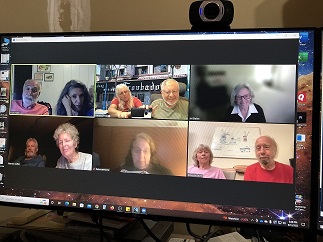
Mitchell, David, Utopia Avenue, 592 pages, 2020, Random House (paperback/Kindle/unabridged audio) (Longlisted for Carnegie Medal for Excellence in Fiction; One of Best Books of Year: NPR, WaPo, USA Today, Guardian, Independent, Kirkus Reviews, Men’s Health, PopMatters) (While not all finished reading the longer-than-usual “summer” book, we all enjoyed its “name-dropping” verisimilitude of 1960s folk/rock musicians, though one of our favorite authors wasn’t even born until 1969 - we shared how our own experiences related, as well as catching the “Easter eggs” of references to his previous novels we read and liked.) (9/13/2022)
Recommended supplemental viewing on the British music and pop culture scene of the period:
Ridley Road - primarily from female point of view - novel by Jo Bloom, and the 4-episode PBS “Masterpiece Theater” adaptation, streaming for station members on "Passport".
Rock Follies: the 12 episodes of the 1st season (1976) are streaming on You Tube, from a video tape, as the DVD is not available for the U.S., and the CD is only available as a collector's item. Primarily from the point of view of a female trio, though written by American Howard Schuman, the terrific songs were by a founding member of Roxy Music, Andy Mackay.
The Beatles: Get Back (Disney+ docu-series)
Mo, Yan (Chinese) (Nobel Prize winner) Red Sorghum: A Novel of China, 1987, English translation by Howard Goldblatt, 1993, 368 pages (Yimou Zhang’s 1987 film adaptation is difficult to find with English subtitles on U.S. playable DVD.) (While some were so turned off by the bloody, graphic violence that they couldn’t finish it, the rest were intrigued by how the author got around censorship by portraying Japanese as monsters and pre-revolutionary society as abusing peasants with internecine battles, but we weren’t sure about his message about how the Communists were different.) (1/8/2013)
Modiano, Patrick (French) (translated by Daniel Weissbort), Missing Person, 1978/English edition 2014, 168 pages (Prix Goncourt/Nobel Prize) (While all enjoyed reading the book as a detective story, our lively discussion of the exploration of the protagonist’s changing sense of identity drew out metaphors of France’s amnesia of its collaborations under Nazi Occupation.) (2/3/2015)
We warmly met in Brooklyn on an icy evening (thanks to Debbie Bernick for the photos):


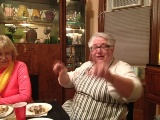
Moore, Alan (writer) and Gibbons, Dave (illustrator), Watchmen, 1995, 416 pages, DC Comics (compilation of the 12 "magazine" issues originally published from 1986-1987- our first graphic novel) (Half our members were so annoyed at the selection and the politics, slowness and violence of the work that they found excuses not to come, but the Rest of Us were intrigued by its multi-layered contemporization of Nietzschean superman analysis through interweaving the far and recent past, present and future of an alternative history of the Cold War with eerie echoes today. Who is a liberal? Who is a conservative? Who is evil? Who is insane? Can the end justify the means? We have not seen the movie adaptation.) (6/1/2009)
Morrison, Toni, Beloved (Absolutely shocking that this is not on the Modern Libary list of 20th Century classics)
Morrison, Toni, Home, 2012, 160 pages (also available on Kindle/Nook and unabridged audio) (Most felt it was a striking evocation of mid-20th century American life for black men, particularly for a veteran of the “forgotten” Korean War going across the country, and women creating community, especially in the segregated South.) (4/2/2013)
Morrison, Toni, God Help the Child, 2015, 192 pages (paperback and Kindle) (We all agreed this was the weakest of her books we’ve read, feeling it seemed incomplete or rushed, despite its insights on skin shade discrimination within African-American families and the lasting impact of child neglect.) (5/3/2016)
Murakami, Haruki (Japanese), South of the Border, West of the Sun, 1998, 224 pages (Is it a guy book or a girl book? Is she real or fantasy? Is he having a psychotic breakdown or just a mid-life crisis? And how much is autobiographical? Great discussion! The group was disappointed that I didn't think to bring illustrative jazz CDs. We liked it so much we're reading his longer, more difficult master work next.) (8/20/2002)
Murakami, Haruki,The Wind-Up Bird Chronicle, 1997, 607 pages (We all agreed this was a special, unpredictable book that we could only run out of time to discuss all the recurring themes (pain, water, animals, dark, isolation, clairvoyance), metaphors (what are men? what are women? Japan and its militaristic past vs. individual history?), characters (who is real and who isn't?) Even though he repeats some elements from the later book of his we read, we would even love to read this one by a different translator for comparison. (10/3/2002)
Murakami, Haruki, Kafka on the Shore, 2005, 480 pages (The most accessible of his books in a captivating page-turning story, brimming with direct and indirect high and pop culture references, from inspirational to satirical, in fusing an East/West mythology with his ongoing themes that made for a lively discussion about metaphors, memory, guilt and temporal anomalies.) (9/4/2006)
Murakami, Haruki, IQ84, 2011, 944 pages in hardcover, 1184 pages in 3-volume Vintage paperback boxed set, also available in Kindle/Nook/unabridged audio (We assigned it for first August, then September 2012, several members read it, or at least started reading it (to mixed reactions), but the consensus was that it was just too long for a club assignment.) (8/6/2012)
Tony Takitani is the first full-length movie adaptation of a Murakami story.
Murdoch, Iris (Irish), The Bell, originally published 1958, 320 pages (paperback, Kindle and unabridged audio) (Though not all enjoyed reading the book, there was a vigorous discussion and disagreements about what each of the characters represented, let alone the bells, in terms of sex and religion in the 1950’s setting, and the author’s atittude.) (7/12/2016)
Recommended related film: Richard Eyre’s bio-pic Iris (2001), based on the memoir by her husband John Bayley.
Naipaul, V.S. (Indian diaspora), A Bend in the River (5/1993)
Ndibe, Okey (Nigerian), Foreign Gods, Inc., 352 pages, 2014 (Mixed reaction to the writing style, but all appreciated the satire of different points of view well-captured once the main character is back home in Africa.) (4/10/2015)
Némirovsky, Irène (French), Suite Française, originally written 1942, published 2006 in a British English translation by Sandra Smith, 448 pages (All were astounded by this incisive and fairly bitter critique of France’s La Comédie humaine amidst war and occupation, written astonishingly clear-eyed while the events were happening, and lots of discussion about the “what if. . .” of being left uncompleted by a Russian ex-pat not anticipating her own murder at the hands of what she thought was a civilized enemy. Catherine Bernstein’s documentary Murder of a Hatmaker, seen at the NY Jewish Film Festival, is useful contextual complement.) (11/12/2007 and (12/28/2007)
We missed the Museum of Jewish Heritage's exhibition Woman of Letters: Irène Némirovsky and Suite Française
My commentary on the film version: Suite Française
Nguyen, Viet Thanh (Vietnamese-American), The Sympathizer, 384 pages, 2015, Grove Press, paperback/Kindle/audio unabridged (Pulitzer Prize; Finalist, PEN/Faulkner & Bingham Awards; Best Book of the Year on 20+ lists, including Guardian, LA Times, NYT Book Review, Slate, WSJ, WaPo; Edgar Award for Best First Novel; Carnegie Medal for Excellence in Fiction; Dayton Literary Peace Prize for Fiction; Center for Fiction First Novel Prize; Asian/Pacific American Award for Literature; California Book Award for First Fiction; Assoc for Asian American Studies Award for Best Book in Creative Writing; Medici Book Club Prize; Finalist for ABA Indies Choice Book of the Year; Shortlisted for International Dublin Literary Award) (Though half the group didn’t finish the book, all appreciated the language and distinct Vietnamese point-of-view of their war, as well as some pointed satire.) (10/3/2019)
Park Chan-wook and Don McKellar adapted into a 2024 limited series that streams on Max.
Ninh, Bao (Vietnamese), The Sorrow of War (translated by Phan Thanh Hao, edited by Frank Palmos) 1995, 224 pages (While we debated whether the characters were metaphors for the country, all were fascinated by this vivid, unideological, view of the ravages of the war, on men and women, from the opposite perspective than what we were told, like an updated All Quiet on the Western Front.) (10/5/2009)
Norman, Howard (Canadian), The Bird Artist (12/17/1997)
Nothomb, Amélie (Belgian), Fear and Trembling, 144 pages, 2002, St. Martin’s, available in paperback/Kindle (originally published in French in 1999 as Stupeur et Tremblements) (Rousing discussion amid a Japanese feast of how realistic vs. extreme socially satiric, funny vs. shallow, is this embed’s look at Japanese corporate culture.) (3/5/2020)
Nunez, Sigrid, The Last of Her Kind, 2006, 384 pages (While all the baby boomers relished the evocation of our social and political awakenings here in New York City, most found the characters shallow and not completely credible.) (12/7/2009)
Nunez, Sigrid, The Friend, 223 pages, 2018, Riverhead, paperback/Kindle/audiobook (National Book Award) (Even with a smaller attendance than usual, we all agreed that this was aimed at a jury of burned-out writing/English teachers, full of quotations and gimmicks.) (11/5/2019)
Oates, Joyce Carol, We Were the Mulvaneys, 1996, 464 pages (Oprah's Book Club selection 2001) (While several members couldn't get into it and gave up, the rest got involved in the family saga full of symbolism, even if not all the characters' actions were credible. Oops, we forgot to cast it!) (7/6/2009)
Obreht, Téa (Serbian-American), The Tiger’s Wife (Orange Prize), 2011, 352 pages, also available in Kindle/Nook/unabridged audio (We were all astonished that a young, debut novelist could be so in touch with the past, death, and myths, let alone with spare and beautiful language, surprising characters, and striking images, not that we could figure out all the symbols.) (5/1/2012)
O’Brien, Tim, In the Lake in the Woods (Effective evocation that the Vietnam War still isn't over in hearts and minds)
Oe, Kenzaburo, A Personal Matter, 1969 (Wrenching, whether or not it's considered a Japanese critique or a universal young man's book) (1/5/1999)
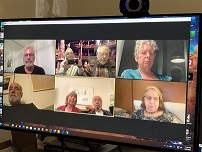
O’Farrell, Maggie (Northern Irish-born/Scottish-resident), Hamnet, 320 pages, 2020 (in UK), Vintage (Women’s -FKA Orange- Prize; Nat’l Book Critics Award; Dalkey Literary Award; Shortlist, Walter Scott Prize; Longlist, Carnegie Medal; on NYT and NYPL Best Books of Year lists) (All loved the language, perception, creativity, characters, and giving a silent woman from history a three-dimensional life.) (3/8/2023)
Director Chloé Zhao’s 2025 film adaptation, co-written and co-produced with O’Farrell, is a faithful and even more emotional presentation of the story, with a stirring ensemble and lovely production design, via Focus Features. (11/28/2025)
Ondaatje, Michael, The English Patient (We liked the book much better than the movie.)
Ondaatje, Michael, Anil's Ghost, 2001, 320 pages (Our session was originally scheduled for 9/12/01 -- what a difference reading it before 9/11 and discussing it after, with terrorism come to our home town. Much discussion of whether one person's terrorist is another's freedom fighter and if religion and art can be a salvation, or just an excuse and an escape. And who is her ghost?) (10/23/2001)
Ondaatje, Michael, The Cat's Table, 2011, 288 pages (We enjoyed the imagery of young boys run amuck on a lively multi-cultural, multi-class ship full of distinctive characters who aren’t who they seem, and the metaphor of a symbol of the end of empire moving through the cusp of post-colonial changes.) (2/5/2013)
Onetti, Juan Carlos (Uruguayan), A Brief Life, translated by Hortense Carpentier, originally published in Spanish in 1950, 304 pages in paperback (Only two of us even finished it, and though we considered if the translation contributed to the turgidity, the consensus was the writer/protagonists pretentiously played with unsympathetic characters.) (6/7/2011)
Here's a film out on DVD based on one of his short stories: Bad Day To Go Fishing (Mal Día Para Pescar)
Orwell, George (English), Burmese Days, 352 pages, originally published 1934 by Harpers, now available by different publishers in paperback and on Kindle (Good discussion on the autobiographical elements, experiences, realities, and impacts in Burma. (10/22/2025)
A new well-researched docu-drama also offers a serious look at British colonialism in the same period, specifically in the Palestine Mandate: My review: Shoshana, now On Demand.
Orwell: 2+2=5, the new bio-documentary by the eminent filmmaker Raoul Peck in cooperation with the Orwell Estate, opened in theaters October 3.
Osborne, John, Look Back in Anger (a play) (5/11/1999)
Otsuka, Julie, When the Emperor Was Divine, 2002, 160 pages (While we all admired the literary style of the individual voices and points of view of the experiences of members of a Japanese-American family vs. their neighbors after Pearl Harbor, most of our conversation centered on how chillingly it showed how it could absolutely happen again -- and is thisclose to happening again. The moving doc The Cats of Mirikitani vividly brings all these connections home.) (1/3/2006, supplemented 3/24/2007)
Otsuka, Julie, The Buddha in the Attic, 2011, 144 pages, also available in Kindle/Nook/unabridged audio (Pen/Faulkner award) (While some objected to the lack of plot and to whether it was even a novel, all agreed on the poetic language and unique look at Japanese immigrant history through the eyes and feelings of women.) (8/6/2012) (My History Reading Group read and reviewed several of the books she used as source material.)
Owens, Delia, Where The Crawdads Sing, 384 pages, 2018, Putnam, available in paperback/Kindle/audiobook (B&N Best Book; Reese Witherspoon Hello Sunshine Book Club – she is producing the film adaptation.) (In our first online meeting, via Zoom due to Covid-19 shelter restrictions and without shared dinner, we were able to have full participation, but there was a split vote. While we all appreciated the descriptions of the natural world of the North Carolina coast and the central character intriuging, some thought the other characters and the plot they were inveigled in pedestrian.) (4/14/2020)
Oz, Amos (Israeli), Black Box,, 259 pages (Very effective epistolary novel that we all felt works sensitively about very individual Israelis and some felt was also specific metaphors for Israel.) (late 1990’s)
The Fourth Window (HaChalon HaReviee) - Yair Qedar’s bio-documentary puts this work in the context of Oz’s life and oeuvre. (as seen at 2021 Other Israel Film Festival)
Ozeki, Ruth (Canadian-American Buddhist), A Tale for the Time Being, 2013, Penguin, 432 pages (Los Angeles Times Book Prize; shortlisted for Booker Prize and National Book Critics Circle Award) (While we debated magic-realism vs. simplistic scientific explanations vs. author’s arbitrary manipulation, all found the treatment of continuities in generations of a Japanese family over a century richly imagined.) (12/8/2015)
Pamuk, Orhan (Turkish), Snow, 2004, 448 pages (While we felt we had to slog through characters at first spouting different viewpoints, the fascination of the absurd takes over, as he cynically savages all views, including his role as a writer, in Turkish society for fusing the personal and the sexual with the religious and the political so we divided on whether to laugh at it as a satire or cry at it as a pessimistic observation on the role of suicide. It certainly made us aware of his legal problems with the government and the debate on Turkey's admission to the EU with more clarity.) (10/11/2005)
Parks, Suzan-Lori, Getting Mother's Body, 2003, 257 pages (Unanimous admiration for richly drawn characters who speak in vivid vernacular across a cinematic landscape.) (3/1/2011)
The author also recorded the mother's blues in Songs From Getting Mother's Body.
Patchett, Ann, Bel Canto, 2001, 336 pages (The majority enjoyed this imaginative riff off a real political hostage taking in Lima, Peru into an examination of fate, opportunity, and self-fulfillment from different perspectives.) (5/6/2003)
The novel was inspired by the real situation portrayed in the documentary The Siege (La Toma (briefly reviewed at 2011 Human Rights Watch Film Festival, dedicated in memory to my activist dad)
Patchett, Ann, The Dutch House, 352 pages in paperback, Kindle and audiobook, 2019, Harper (Pulitzer Prize finalist; In Best Books of the Year: NPR, WaPo, Oprah Magazine, Real Simple, Good Housekeeping, Vogue, Refinery29, Buzzfeed, Time, NYT Book Review Notable Book) (While some of us at least enjoyed the easy read with entertaining plot and a few good lines, all had gripes about the characters’ credibility, the first-person male narrator, loose ends, and that huge house.) (4/14/2021)
Patchett, Ann, Run, 304 pages, 2007, Harper, paperback/Kindle/audio book (In a easy-reading, story-heavy book, our discussion helped each clarify a missed detail.) (11/7/2023)
Pears, Iain (English), The Dream of Scipio, 2002, 416 pages in paperback (Not all of us appreciated trying to follow the century-jumping in the storylines, but we had a lively discussion on the parallels of civilization vs. the barbarians, what each character represented, and if the same actor should play the same themed character in a film version to add to the parallelism.) (4/5/2011)
A character is inspired by the central figure portrayed in the film Agora.
Percy, Walker (Southern American), The Moviegoer, 1961, 256 pages (It just seemed as if all his existential malaise wasn’t any more profound than could be cured by the coming of change.) (early ‘90’s)
Interesting background on the context of his Southern patrician family in Barry, John M., Rising Tide: The Great Mississippi Flood of 1927 and How It Changed America, discussed by my History Reading Group.
Perez-Reverte, Arturo, The Club Dumas, 1997, 384 pages (A too-look-at-me-I'm-clever detective yarn filled with literary references, especially about book collecting and classic mysteries, with a dollop of male fantasy fulfillment. Instead, read Agatha Christie's The Murder of Dr. Roger Ackroyd or Sherlock Holmes or catch an The X Files for more interesting treatment of the attraction of the devil.) (7/6/2004)
Petterson, Per (Norwegian), Out Stealing Horses, (translated into British vernacular by Anne Born), 2007, 256 pages (All admired the spare language style that matched the physical environment to memory and aging, even though we had to parse out plot interpretations.) (10/20/2008)
Petterson, Per (Norwegian), I Curse the River of Time, 2008, translated into British vernacular with Charlotte Barslund, first published 2010, 240 pages (While we continued to admire his language, most of us were very disappointed by the limited story compared to his earlier book and this very unsympathetic lead character—we spent some time coming up with suitable derogatory adjectives--plus it was crucial to have read the prequel In the Wake, 2000, English translation by Anne Born first published 2006, 240 pages) (10/4/2011)
A member noted what was still unresolved in our discussion: “Why did he write this story and why did he end it that way? What did the author want us to feel in the end?”
Powers, Richard, The Overstory, 512 pages, 2018, Norton (Pulitzer Prize; shortlisted for Man Booker Prize; Finalist, PEN/Jean Stein Award; Grand Prix de Littérature Américaine; NYT Notable Book; WaPo, Time, Oprah Magazine, Newsweek, Chicago Tribune, Kirkus Reviews Best Book of Year) (Even though not all were able to finish during the summer, most were entranced by the language, characters, organization, and information on the life of trees, though just a couple of us thought they were too anthropomorphized.) (9/3/2019)
Proulx, E. Annie, The Shipping News
Proulx, E. Annie, Barkskins, 2016, 736 pages, Random House (Kirkus Prize for Best Novel Finalist; NYT Notable Book; a WaPo Best Book of the Year) (With most agreed that the main theme was indigenous people getting squeezed through history between capitalism vs. the environment, the discussion kept coming back to disappointment with the ending that left the family and issues unresolved – that I couldn’t comment on because I was the only one not to finish the summer-length reading due to family/work.) (9/4/2018)
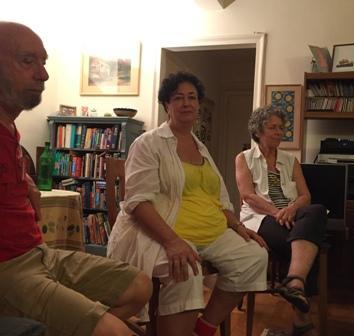
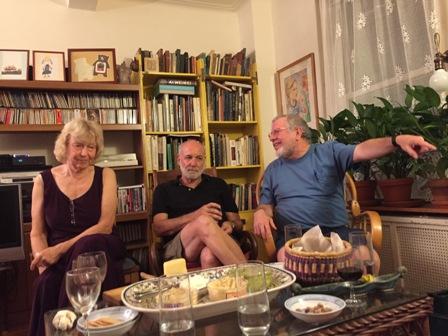

Ratner, Vaddey (Cambodian-American), In The Shadow Of The Banyan, 2012, 352 pages (available on Kindle/Nook and unabridged audio) (Finalist for PEN/Hemingway Award) (selected in memory of Bill Lavner as his recommendation) (We admired the author’s honesty to fictionalize her childhood’s and her mother’s memories instead of following the fashion of artful memoir, but we missed the broader context and explanations.) (7/23/2013)
Recommended related documentaries: Enemies Of The People (also briefly reviewed at 2010 Human Rights Watch International Film Festival); Brother Number One (briefly reviewed at 2012 Human Rights Watch International Film Festival, both seen at Film Society of Lincoln Center); Adrian Maben’s 2011 Comrade Duch: The Bookkeeper of Death; Rithy Panh’s S21: The Khmer Rouge Killing Machine (2003), Duch: Master Of The Forges Of Hell (2011), and The Missing Picture (L'image manquante) (previewed at 2013 New York Film Festival of Film Society of Lincoln Center) (My additional notes.)
Recommended fictionalized re-enactment: First They Killed My Father: A Daughter of Cambodia Remembers
Robbins, Tom, Skinny Legs and All (8/1993) (Prescient satire)
Robinson, Marilynne, Housekeeping, 1981, 224 pages (Though all loved the imagery, mixed reaction, with half either falling asleep or not finishing it, but spirited discussion as to whether characters were eccentric or just plain crazy.) (11/10/2006)
Rolfo, Juan (Mexican), Pedro Páramo, originally published 1955, 2023 translation by Douglas J. Weatherford, 144 pages, introduction by Gabriel García Márquez, Grove Press reissue edition (paperback/Kindle) (Split reaction – some were too confused by jumps in time, which characters were speaking, and if they were alive or dead; others appreciated the magic realism-like cinematic techniques, cynicism and criticism of social class, the Catholic Church and the churn of revolution that kept the rapacious upper class in power.) (4/16/2024)
Netflix is streaming the 2024 film adaptation, directed by Mexican cinematographer Rodrigo Prieto, written by Spanish writer/director Mateo Gil. In addition, Netflix is streaming One Hundred Years with Juan Rulfo (Cien años con Juan Rulfo), one part from the six-parts in-progress series by his son filmmaker Juan Carlos Rulfo, that also explores Rulfo’s photography, drawing on family memories and the voices of friends, colleagues, and critics. (updated 1/30/2025)
Roth, Philip, Goodbye Columbus
Roth, Philip, Operation Shylock
Roth, Philip, The Plot Against America, 2004, 416 pages (While there was one vote that it was over the top, the rest of us marveled that even though this was part of the "Roth" novels that are inspired by vividly recalled details from his real life, here his youth in ethnic Newark, it was misogyny-free and even mother-affectionate as it step by step from the real to the surreal created another, more artistic version of It Could Happen Here that most felt had scarily contemporary warnings.) (3/7/2006)
HBO adaptation (2020)
Rowling, J. K.: Harry Potter and the Sorcerer's Stone (Book 1), (the Americanized title), 312 pages; Harry Potter and the Chamber of Secrets, (Book 2), 352 pages; Harry Potter and the Prisoner of Azkaban (Book 3), 435 pages, (all Scholastic). Also available unabridged on tape and CD (from Random House Listening Library). (The consensus was that this is classic children's "cross-over" literature for adults too, on a par with "Alice in Wonderland.") (8/2000)
My reviews of the movies: Harry Potter and the Sorcerer's Stone, Harry Potter and the Chamber of Secrets, Harry Potter and the Prisoner of Azkaban, and Harry Potter and the Goblet of Fire
Roy, Arundhati (Indian), The God of Small Things, 1998, 336 pages (Dazzling view of the English language from India post The Jewel in the Crown.)
Meg’s fabulous appetizer: we had to peel the eggs ourselves, but the potatoes were perfect! - Photo and caption by Eva-Lee Baird: 
Ruge, Eugen (translated from the German by Anthea Bell), In Times of Fading Light, 344 pages, Greywolf Press, originally published 2011/English translation 2014 (German Book Prize) (Mixed vote, with some objecting to either unsympathetic characters or the unchronological chapters, but all did appreciate the multi-layered metaphors for the life span of GDR/East Germany, and symbolized in our appetizers.) (5/7/2019)
Shown in NY at the 2018 KINO! Festival of German Films), the film adaptation In Times Of Fading Light (In Zeiten des abnehmenden Lichts) (2017) starring the late Bruno Ganz, directed by Matti Geschonneck, is not available in Region 1 DVD.
Rushdie, Salman (Indian), The Ground Beneath Her Feet, 2000, 575 pages (A rock 'n' roll Orpheus and Euridice) (While some complained that the length could have been trimmed and that the author was showing off his multicultural and popular culture erudition, all concurred the book is phenomenal and engendered much enthusiastic discussion.)
Rushdie, Salman (Indian), Midnight’s Children, 1981, 632 pages in hardcover/536 pages in paperback (available on Kindle/Nook/unabridged audio) (Winner of the Booker of Bookers) (While being a bit intimidated by his intellect, erudition, and sweeping knowledge of the 20th century history and politics of the Indian sub-continent, we enjoyed his humor and discussing his views of religion, nature vs. nurture, and women’s options, with admiring comparisons to Voltaire, Charles Dickens, Jane Austen, and Mark Twain.) (9/3/2013)
The impact of this period on the Sikh community is thrillingly shown in the Bollywood epic Bhaag Milkha Bhaag (My additional notes.)
Russell, Karen, Swamplandia!, 2011, 336 pages in hardcover/416 pages in paperback (available on Kindle/Nook) (Finalist for Pulitzer Prize, ALA’s Carnegie Medal for Excellence in Fiction, and Orange Prize) (All agreed it took almost half the book to get involved beyond the colorful descriptions and affection for the Everglades environment, but then the story really kicked in, especially as powerful metaphor of Florida past and present.) (5/7/2013)
Harold was reminded of a Summer 1956 trip to a comparable Florida attraction:
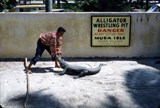

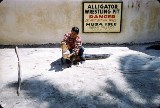
Russo, Richard, Empire Falls, 2001, 483 pages (An enjoyable, cinematic, small-town, family saga that also works on a metaphorical level, encouraged by the symbolically named characters.) (4/1/2003)
Russo, Richard, Straight Man, 1997, 391 pages, also available in Kindle/Nook/unabridged audio (Though the female members in attendance felt the women were not very credible, all appreciated the satire of academia and the amusing word play.) (4/3/2012)
Ryan, Donal (Irish), The Spinning Heart, 162 pages, 2014, Steerforth (Dublin Book Fest’s Irish Book of the Decade; The Guardian’s First Book Award; Irish Book Award’s Newcomer of the Year & Book of the Year; Library Journal’s Best Book of Year; Finalist, Booker Prize; Shortlist, Dublin International Literary Award; EU Prize for Literature - Ireland) (paperback/Kindle/audiobook) (Sharply divided opinions, and some couldn’t bring themselves to finish even the short book, due to the shifting points-of-view in each chapter and the domestic violence, let alone the thick slang and local references, while others appreciated the language and authenticity of the economically stressed working-class milieu.) (12/17/2024)
Several members are on their own proceeding to the author’s follow-up, Heart, Be At Peace, 208 pages
Saramago, Jose (Portuguese), Baltasar and Blimunda, 1987 (Portuguese) (A tough read --OK it took me months to finish it-- but quite an audacious Balzacian take on Portugal in the 1700's.) (4/13/1999)
Saramago, Jose (Portuguese), The Cave, 2002, 320 pages (While several members noted that this is a Marxist interpretation of Plato's Cave with an idealized, intellectual proletariat that all noted is a slow stream-of-consciousness read, the conception of a we're-almost-there-yet future of controlling capitalism vs. people enlivened by creative production was intriguing.) (6/1/2004)
Schlink, Bernhard (German), The Reader, 1995 (Ignoring the lack of character development and focusing on the complex symbolism, this fast read spurred one of our best discussions as it explores the banality of evil in post-Holocaust Germany.) (2/1/2000)
My review of the film, and my commentary on the Jewish women. Thoughtful Schlink interview about the book and film. The documentary 2 Or 3 Things I Know About Him (2 oder 3 Dinge, die ich von ihm weiß) raises similar issues.
Sebald, W.G. (German), Austerlitz, 2001, 304 pages (Split down the middle: half thought it was intellectual pretension, the other half thought it was an insightful tour of memory and cultural and personal identity of Europe from Napoleon to Hitler to the EU.) (11/11/2002)
We won’t be reading Sebald’s The Rings of Saturn (1992), but it covers some of the same themes, that are sifted in the documentary Patience (After Sebald) I briefly reviewed at 2011 New York Film Festival of Film Society of Lincoln Center.)
Sembène. Ousmane (Senegalese), God's Bits of Wood, first published in English in 1962, as translated by Francis Price; paperback most recently re-published by Longman, 2008 (originally published in French as Les Bouts de Bois de Dieu in 1960) 252 pages (Not available on Kindle) (Though several had problems reading the book, both as a tough slog with a large ensemble, with complicated names and relationships, and the small print that required reading glasses or a magnifying glass, all appreciated our first-time look at the point-of-view inside Africa from a French colony and a Communist’s rejection of capitalism, colonialism, Islam, and traditional culture, with hope for the involvement of women, as the most powerful characters, in achieving a modernizing society.) (1/5/2016)
My review of the bio-documentary Sembène!, plus my commentary on the missing Jewish women, for background to the novel.
Shafak, Elif (British-Turkish), Island of Missing Trees, 368 pages, 2023, Bloomsbury (Reese’s Book Club Pick; BookTube Silver Medal; Shortlisted, Women’s Prize) (While the major character of “The Fig Tree” centered much of our discussion, we did appreciate the author’s focus on the impact on diverse generations of the long-running ethnic divide of Cyprus.) (10/23/2024)
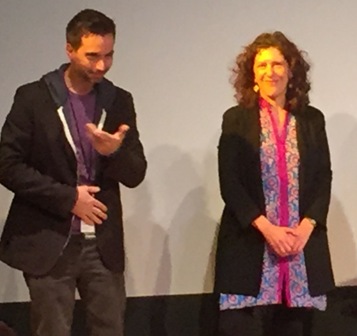
Here’s our own dancer (and choreographer) Tamar Rogoff accepting audience applause at the NYC premiere of her documentary Enter the Faun at the Margaret Mead Film Festival
Shakespeare, Nicholas, The Dancer Upstairs, 1997, 288 pages (I missed the meeting, but the group reported the discussion centered around the hopelessness of the middle between extremists.) (7/15/2003)
My review of the movie)
Shakespeare, William, Merchant of Venice (multiple editions/recorded performances) (All intrigued by the change-of-pace to visit/re-visit a classic, we focused on why it’s a comedy, the anti-Semitism, male relationships, the unlikability of most of the characters, and how Portia steals the show.) (9/4/2012) My review of the 2004 film version)
Shamsie, Kamila (Pakistani British), Home Fire, 288 pages in paperback (also in Kindle and audiobook), Bloomsbury/Riverhead, 2017 (Women’s Prize for Fiction; Finalist, International Dublin Literary Award; Longlisted, Man Booker Prize) (While there was disagreement on the credibility of some of the characters, particularly the males, we had a really good discussion about ethnic and political assimilation issues in England, the pull of religious and political cults, and the contemporary relevance of Greek tragedy.) (1/13/2021)
Shamsie describes these play translations as “constant companions”, and reading them adds an additional appreciation to the reading and discussion: Anne Carson’s Antigone (Oberon Books, 2015) and Seamus Heaney’s The Burial at Thebes: Sophocles’ “Antigone” (Faber & Faber, 2005).
Shapiro, Dani, Signal Fires, 240 pages, 2022, Knopf (Time, Real Simple Best Book of Year; WaPo Notable Book; An NPR Favorite Book of Year) paperback/Kindle/audiobook) (Despite some complaints about stereotype characters and if the discordant chronology was a gimmick, we discussed the themes of family secrets, hidden trauma, and how the stars and planets fit in.)
Recommended: podcast interview with Shapiro about this book.
Celebrating the Bicentennial of Mary Shelley’s book, Harold and Nora at Morgan Library & Museum’s wonderful exhibition “It’s Alive! Frankenstein at 200”, up through January 27, 2019
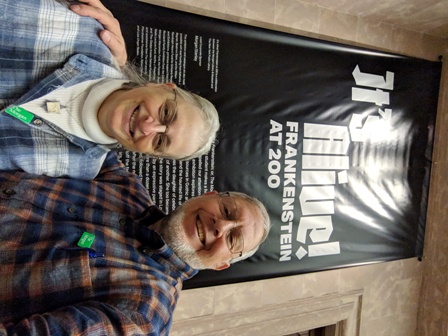
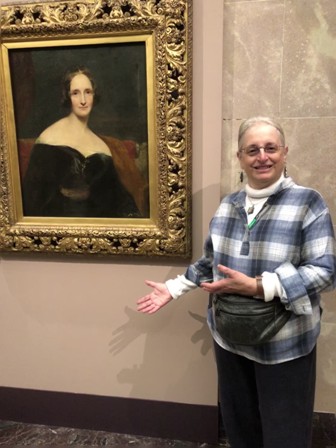 Shelley, Mary Wollstonecraft; edited by Guston, David H. and Finn, Ed, Frankenstein: Annotated for Scientists, Engineers, and Creators of All Kinds, with essays by Elizabeth Bear, Cory Doctorow, Heather E. Douglas, Josephine Johnston, Kate MacCord, Jane Maienschein, Anne K. Mellor, and Alfred Nordmann, 2017, 320 pages, MIT Press (With most of us never having read the original work before, a majority loved it, and somewhat found the footnotes and essays useful; those who didn’t were disturbed by Victor Frankenstein’s unlikability, but he was fodder for a lot of discussion about morals and responsibility – and admiration for Mary Shelley.) (11/6/2018)
Recommended fiction feature bio-pic: Mary Shelley (My preview at 2018 Tribeca Film Festival)
Shelley, Mary Wollstonecraft; edited by Guston, David H. and Finn, Ed, Frankenstein: Annotated for Scientists, Engineers, and Creators of All Kinds, with essays by Elizabeth Bear, Cory Doctorow, Heather E. Douglas, Josephine Johnston, Kate MacCord, Jane Maienschein, Anne K. Mellor, and Alfred Nordmann, 2017, 320 pages, MIT Press (With most of us never having read the original work before, a majority loved it, and somewhat found the footnotes and essays useful; those who didn’t were disturbed by Victor Frankenstein’s unlikability, but he was fodder for a lot of discussion about morals and responsibility – and admiration for Mary Shelley.) (11/6/2018)
Recommended fiction feature bio-pic: Mary Shelley (My preview at 2018 Tribeca Film Festival)
Shields, Carol (Canadian), Stone Diaries, 1994, 386 pages (late-‘90’s)
 -Gary Shteyngart speaking very personally as a former HIAS client, from USSR, at the Jews for Refugees Rally, 2/12/2017, in front of what my Grandma Rose always called "Kessel Garden", where she first entered the U.S. as a 15 year old traveling alone to meet up with her siblings here. Took me years to realize that was Castle Garden, the immigration depot that was built on the top of what has now been restored back to Castle Clinton, the Revolutionary War fort.
-Gary Shteyngart speaking very personally as a former HIAS client, from USSR, at the Jews for Refugees Rally, 2/12/2017, in front of what my Grandma Rose always called "Kessel Garden", where she first entered the U.S. as a 15 year old traveling alone to meet up with her siblings here. Took me years to realize that was Castle Garden, the immigration depot that was built on the top of what has now been restored back to Castle Clinton, the Revolutionary War fort.
Shteyngart, Gary, Absurdistan, 2006, 352 pages (LOL at some scenes, the majority felt it was a repetitive display of too-clever crude humor that overstayed its welcome with unsympathetic, unchanging characters by an author who did himself no favor claiming the mantle of a Russian-American satirist in the vein of Heller, Sterne, Swift and Voltaire.) (3/3/2008)
Silber, Joan, Improvement, 250 pages, 2017, Counterpoint, available in paperback/Kindle/audiobook (National Book Critics Award; PEN Faulkner Award, WaPo Notable Work of the Year; WSJ Top Fiction Title; Newsday and Kirkus Best Book of the Year; NYT Editor’s Choice) (Mixed vote, but good discussion on which of the diverse characters “improved”.) (2/11/2020)
Singer, Isaac Bashevis, Satan in Goray, 160 pages (And he was only 26 when he wrote this vividly mature first novel.)
Smiley, Jane, The Age of Grief, 1987, 213 pages (a novella and short stories, which led to our policy decision that short story collections don't make for good discussions.) My review of the movie version - The Secret Lives of Dentists(2/1993)
Smiley, Jane, A Thousand Acres (5/13/1997)
Smith, Ali (Scottish), Autumn, 272 pages, 2017 (Man Booker Prize Finalist; long-listed for the Gordon Burn Prize; a NY Times Best Book of the Year) (Mostly negative reaction due to its wandering, episodic structure in time and place, particularly the long stops with obscure 1960’s female celebrities.) (2/7/2018)
Smith, Zadie (British), White Teeth, 2000, 464 pages (We all enjoyed this ensemble romp through the multi-cultural British empire that is now London. While this debut novel was particularly sharp on adolescent experiences close to the author's very young age, we had a jolly good discussion about fate, chance, and who is actually representing Britain. And about the differences in how the author looks in her photo on the hard-cover edition vs. the paperback edition.)
Smith, Zadie (British) (repeat author), On Beauty, 464 pages, 2005, Penguin (Orange Prize; NYT “#94 of 100 Best Books of 21st Century”; Shortlist, Booker Prize; Anisfield-Wolf Prize) paperback/Kindle/audiobook (Almost all enjoyed and admired her writing, plotting, and the varied racial, class, and generational characters.) (4/23/2025)
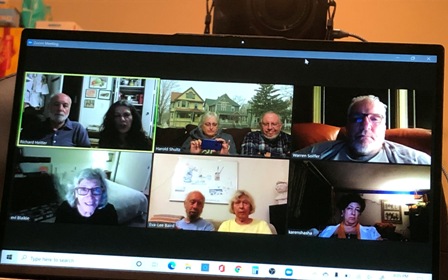
Snyder, Rachel Louise (American), What We’ve Lost Is Nothing, 320 pages, 2014, Scribner (paperback/Kindle/audiobook) (Mixed reaction – from shallow characterizations to effective satire of suburban liberals) (9/8/2020)
Sofer, Dalia, (Iranian-American), The Septembers of Shiraz, 2007, 368 pages (While we debated how much was autobiographical in bringing to vivid life the travails of Jews in Iran under the Shah and the mullahs, our discussion parsed the author’s views of torture vs. the unsympathetic aspects of the central characters.) (9/22/2008)
Soueif, Ahdaf (Egyptian), Map of Love, 1999, 544 pages (Our discussion was better than the book, which we all agreed required a great suspension of disbelief for its plot, inconvenient gaps, and not always convincing changes in POV. We ended up having more of a discussion of the historical, colonial roots of the current Mess O' Potamia and the hopeless future of liberals anywhere in the world than its literary merits.) (8/13/2006)
As quoted in a lecture on "Resurrecting Empire: The End of Year II of the Occupation of Iraq" by Professor Rashid Khalidi: T.E. Lawrence in The Sunday Times, August 1920 - "The people of England have been led in Mesopotamia into a trap from which it will be hard to escape with dignity and honor. They have been tricked into it by a steady withholding of information. The Baghdad communiqués are belated, insincere, incomplete. Things have been far worse than we have been told, our administration more bloody and inefficient than the public knows. It is a disgrace to our imperial record and may soon be too inflamed for any ordinary cure. We are today not far from a disaster…. Our unfortunate troops, Indian and British, under hard conditions of climate and supply are policing an immense area, paying dearly every day in lives for the willfully wrong policy of the civil administration in Baghdad… but the responsibility in this case is not on the army, which has acted only upon the request of the civil authorities."
Spragg, Mark, The Fruit of Stone, 2002, 304 pages (Is it a guy book or about laconic, taciturn Westerners for whom loyalty is more important than communicating?) (12/13/2005)
St. Aubyn, Edward (British), “The Patrick Melrose Novel Series” -- Recommended by Michael Chabon: Never Mind (1992), in hardcover 208 pages, in paperback 128 pages; Bad News (1994) 128 pages; the third book Some Home (1994), 224 pages, originally was the collective name to the trilogy; then the fourth book Mother's Milk (2005), 320 pages, was shortlisted for 2006 Man Booker Prize, and, finally, At Last (2012), 272 pages (We assigned the first and shortest two books, but those who read on to the deft social satires were relieved to get past the literately written, but horrendous difficult-to-read child and drug abuse, though we all appreciated the realism more when we read his Wikipedia bio.) (4/5/2016)
We made it to the Upper West Side despite MTA breakdowns:
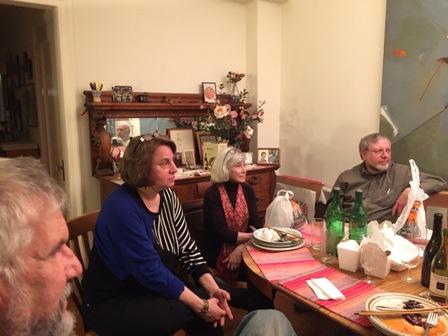
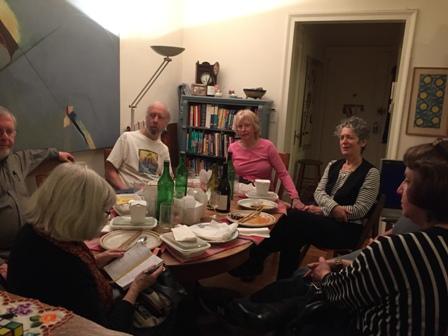
Stegner, Wallace, Crossing to Safety, 1987, 341 pages (No sex, no child abuse, no adultery, just married couples struggling with the frustrations of academic and real life. Starts off in the '30's but feels very contemporary.) (2/9/1999)
Straight, Susan, I Been in Sorrow's Kitchen and Licked Out All the Pots, 1993, 355 pages (While there were complaints that the heroine was a super-hero and the two parts of her life seemed like two books stitched together, we were impressed by the evocation of the rural and urban South at the turn of the civil rights movement.) (12/7/1999)
Szabó, Magda (Hungarian), The Door, originally published in Hungarian in 1987, English translation by Len Rix published by NYRB Classics in 2015, 288 pages (Winner of the Oxford-Weidenfeld Translation Prize and the Prix Femina Étranger) (Even those who were turned off by one or both of the two women lead characters, all were intrigued by their cynically metaphorical representation of class tensions through 20th century Hungarian social and political history.) (7/14/2015)
Tartt, Donna, The Goldfinch, 784 pages, 2013 (Split reactions led to lively discussion about the writing style, length, detailed descriptions reflecting post-recession time and NYC/Vegas/Amsterdam places, credibility of the young male POV, literalness vs. philosophical metaphors of authenticity and art) (Pulitzer Prize winner) (9/2/2014)
Taubs, Susan, Divorcing, 288 pages, originally published 1969, reprinted 2020 by NY Review of Books Classics with introduction by David Rieff in paperback and Kindle (While the narcissistic first section put off several members from even continuing to read, those who plowed through found the language and much to discuss about the autobiographical chutzpah of going backwards through a woman’s exile from her Elektra Complex-obsessed parents, extended Hungarian-Jewish family, her husband, children, and herself.) (2/10/2021)
Tezza, Cristovão (Brazilian), Space Between Color and Shade, 276 pages, 1998 (paperback/Kindle/audio unabridged) (Machado de Assis Award for Best Novel from the National Library of Brazil) (While the majority disliked it for the unsympathetic protagonist and his narcissistic story, the insights of our art teacher member helped us more appreciate the art history references and allusions about artists, the creative process, and fakes.) (1/6/2015)
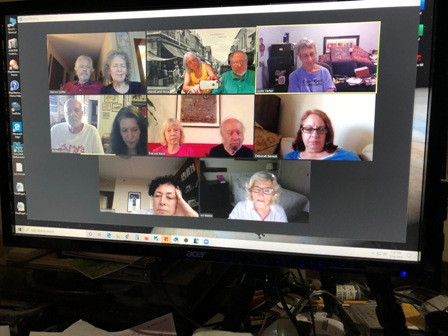 - Zoom meeting discussion on:
- Zoom meeting discussion on:
Toer, Pramoedya Ananta (Indonesian), This Earth of Mankind (Buru Quartet Book 1), 367 pages, originally published 1980, first U.S. publication 1991, translation and Afterword by Max Lane, Morrow (paperback/Kindle) (Mixed reaction: while all appreciated the insight into the impact of European colonialization, here the Dutch in Indonesia, on diverse indigenous society, some found the translation intrusive on the language and style, and the characters one-dimensional, though the plot was intriguing.) (7/14/2020)
Several members were interested in continuing to read the story of these characters: Book 2 is Child of All Nations (1980); Book 3 is Footsteps (1985); Book 4 is House of Glass (1988).
His body of work received: PEN/Barbara Goldsmith Freedom to Write Award that honored writers anywhere in the world who have fought courageously in the face of adversity example of integrity in governance, courageous service to the people, and pragmatic idealism within a democratic society; Magsaysay Award for Journalism, Literature, and Creative Communication Arts as example of the right to freedom of expression; Fukuoka Prize to honor the outstanding work of individuals or organizations in preserving or creating Asian culture; Norwegian Authors' Union award for his contribution to world literature and his continuous struggle for the right to freedom of expression.
Tóibín, Colm (Irish), Brooklyn, 262 pages, 2009 (paperback/Kindle/audio unabridged) (short/long listed for IMPAC/Booker prizes) (Mixed vote – while some appreciated the social history of a female Irish immigrant in the 1950’s, others found the characters too one-dimensional.) (12/2/2014)
At the New York Film Festival press conference at the Film Society of Lincoln Center, I’m the first questioner, challenging that the film adaptation removed what grit there was in the novel, making the film too sentimental. Scripter Nick Hornby, his wife and producer Amanda Poseys, director John Crowley, and the novelist took considerable umbrage!
 - No Jews in this book, but Debbie Bernick documented that we met in person and on Zoom during Hanukkah 2025
- No Jews in this book, but Debbie Bernick documented that we met in person and on Zoom during Hanukkah 2025
Tokarczuk, Olga (Polish Nobel Winner), translated by Antonia Lloyd-Jones, Drive Your Plow Over the Bones of the Dead, 283 pages, 2019, Riverhead (NY Times“Best Book of 21st Century”; Longlist, PEN America Translation Prize; Shortlist, Warwick Prize for Women in Translation; Time, Kirkus Publishers Weekly, BookRiot, NPR “A Best Book of 2019”) $14/Kindle $10 now (All eventually enjoyed the book and its surprising older female protagonist, with some interpreting it as a noir murder mystery, some as social satire, some as commentary on newly capitalist, democratic Poland.) (12/17/2025)
Noted Polish film director Agnieszka Holland adapted the novel into her 2017 award-winning film Spoor (Pokot). It is currently streaming on Amazon Prime and other platforms.
Tutuola, Amos (Nigerian), The Palm-Wine Drinkard (written in 1946; published in 1952) and My Life in the Bush of Ghosts (originally published 1954), 256 pages, Grove Press (in a single volume paperback, but not available in Kindle) (Though not everyone was intrigued enough to read both books, we were fascinated at the sophisticated use of the structure of African folk tales as a way to communicate the richness of pre-colonial spirituality with gods and ghosts, and the pre-Freudian power of dreams.) (3/8/2016)

 in Whitney Museum of American Art collection
in Whitney Museum of American Art collection
Unsworth, Barry, Stone Virgin, 1995, 309 pages (A meticulously organized look at the erotic in artistic impulse inspired by the madonna/whore duality of the Annunciation through history- yeah, a guy book.) (2/13/2003)
Urrea, Luis Alberto (Mexican), Into the Beautiful North, 2009, 352 pages, Little Brown (While we enjoyed the read and the excuse for a Mexican dinner, we felt this was an anecdotal and episodic road trip through many colorful characters and places to represent a range of attitudes towards the U.S./Mexican border and migrants in both directions.) (5/1/2018)
Vargas Losa, Mario (Peruvian), The Feast of the Goat (La Fiesta del Chivo), translated from the Spanish by Edith Grossman, 420 pages, 2011, Farrar Straus, available in paperback/Kindle/audiobook (Selected in memorial to the Nobel Prize-winner’s death, even those who only had time to read the first half concurred it is a masterpiece as an incisive epic on how brutal dictators hold power over individuals through an amoral cult of personality, universally, in the Caribbean/Latin America, and specifically here Trujillo in the Dominican Republic for over 30 years.) (6/18/2025)
Verghese, Abraham (Ethiopian/Keralan, India-American), Cutting for Stone, 2009, 560 pages in hardcover, 688 pages in paperback, unabridged audio book available on CD and Audible download, and on Kindle (While this book gave us the opportunity to do our first take-out dinner from an Ethiopian restaurant, we enjoyed the narrative detail about distinctive Ethiopians, Indians and colonials, but found little of depth to discuss.) (5/17/2010)
Verghese, Abraham (Ethiopian/Keralan, India-American), Tennis Partner, 1998, 352 pages (A memoir the group enjoyed reading.) (10/1/2013)
Vonnegut, Kurt, Timequake, 1997, 272 pages (Read in commemoration of his work having inspired founding of the Book Club, all enjoyed and admired how he used humor in a valedictory last blending of fiction with his real life and the world.) (6/11/2007)


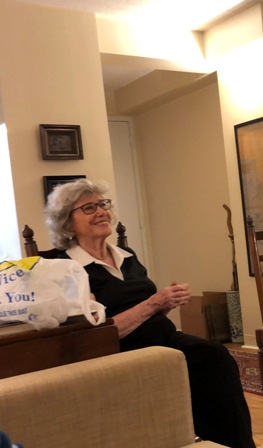
Vonnegut, Kurt, Slaughterhouse-Five (or the Children's Crusade: A Duty Dance With Death), 50th Anniversary Edition, 2009, with a new introduction by Kevin Powers, 231 pages, first edition published 1969 (For some in the group a first-time read, we enjoyed discussed how the style and substance used humor and science fiction to reflect on PTSD, morality, and war.) (6/4/2019)
Director George Roy Hill adapted the book to film in 1972.
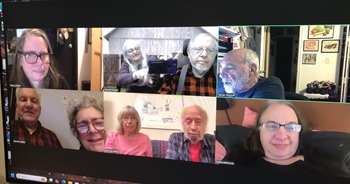
Vuong, Ocean (Vietnamese-American), On Earth We’re Briefly Gorgeous, 256 pages, 2019, Penguin (Before Columbus Fnd American Book Award; Bklyn Public Library Literary Prize; CT Book Award; MA Ctr for the Book Award; Mark Twain Am Voice in Lit Award; N. Eng Indep Bksellers Assoc Award; Publishing Triangle Ferro-Grumley Award; Finalist: Dylan Thomas Prize; Internat’l Dublin Literary Award; Kirkus Prize; Center for Fiction First Novel Prize; Lambda Literary Society Gay Fiction; Pen-Faulkner Fiction Award; Longlisted: ALA Carnegie Medal; Aspen Words Lit Prize; National Book Award; PEN/Hemingway Debut Novel Award) (A divisive book led to good discussion over whether sections that were revealing about the trauma of the post-Vietnam War experience on immigrants were overwhelmed by the poetic language and nostalgia for working-class adolescent angst.) (1/22/2025)
Waldman, Amy (American), The Submission, 2011, Farrar, Straus and Giroux, 322 pages (Selected among best book of the year by: EW, NYT, WaPo, Esquire, NPR) (paperback/Kindle/unabridged audio) From recorder Debbie Bernick: “Thumbs up! We liked the character depictions (especially the uneducated but highly principled Bangladeshi widow, Asma) and we shared our own memories of 9/11 and the controversies over the Memorial. We felt that the main character, Mo, lacked a sense of responsibility to the community since he was doing a public (not private) art project. Tamar shared her own experience of getting community input for and her dance projects in Eastern Europe and the East Village. We discussed Islamic art and gardens, including first-hand observations about Kashmir (Rich & Tamar), Pakistan (Warren) and Iran (Debbie). A great discussion!” (1/2/2018)
”Activist New York” exhibition at the Museum of the City of New York includes WTC and related protests.
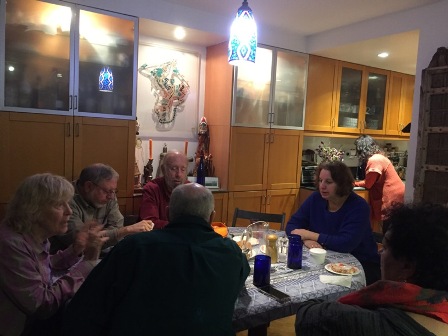 - Eating Southern soul food:
- Eating Southern soul food:
Ward, Jesmyn (American), Salvage the Bones, 2011, Bloomsbury, 261 pages (National Book Award) (paperback/Kindle/unabridged audio) (One of our favorites!) (11/7/2017)
For her personal context, read Men We Reaped: A Memoir, 2013, Bloomsbury, 272 pages
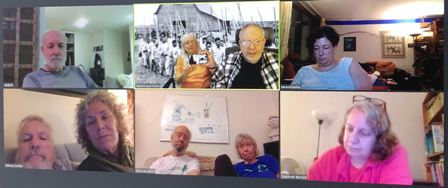
Ward, Jesmyn (American), Sing, Unburied, Sing, 304 pages, Scribner, 2017, (National Book Award; finalist for Kirkus Prize, Aspen Words Literary Prize; Carnegie Medal) (paperback, Kindle, audio) (Despite a divided view whether it was depressing or hopeful, all were struck by her brilliant use of language, complex characters, and deep sense of authenticity.) (11/11/2020)
Whitehead, Colson (Brooklynite), The Intuitionist, 1999, 256 pages (Is it a satire or an allegory on race as it re-imagines urban race relations and the zen of elevators?)
Whitehead, Colson (Brooklynite), John Henry Days, 2001, 400 pages (While a couple of members were so turned off by an early, unsympathetic protagonist to not finish the book, the rest were fascinated by the structure of multiple contacts with an African-American musical and cultural myth, as we tried to work through understanding the ending--accompanied by many versions of the song from my CD collection.)
Whitehead, Colson (Brooklynite), Apex Hides the Hurt, 2006, 224 pages (Split vote on whether this entertaining read rose to the level of Swiftian satire or was just shallow with a racial and historical overlay.) (8/7/2007)
Buried in the Bitter Waters: The Hidden History of Racial Cleansing in America by Elliot Jaspin and the follow-up documentary Banished for background on and the impact of memories of African-Americans driven from their communities.
Whitehead, Colson (Brooklynite), The Underground Railroad, 2016, 320 pages (Oprah’s and Obama’s favorite book of the year) (While we found disjointed style changes a bit awkward and the ending a bit abrupt though we appreciated the Huck Finn connection, we all loved the blending of magic realism and substantial characters with the incorporation of historic truths about chattel slavery as this country’s original sin.) (11/1/2016)

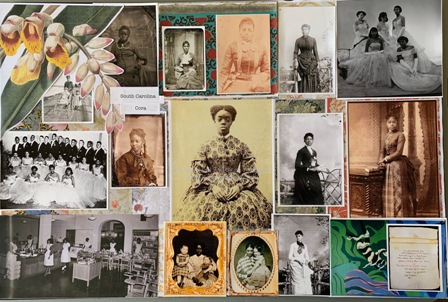 Barry Jenkins’s ten-episode series adaptation, on Amazon Prime Video, makes everything in the novel very explicit. The details are beautiful and highly visual, as indicated in the preparatory works above: Concept Art, by Hugh Sicotte, from Production Designs by Mark Friedberg, and the seriously researched Mood Board - South Carolina, compiled by costume designer Caroline Eselin, as seen on exhibit July 30–October 31, 2021 at Museum of the Moving Image.
There are many related references on slavery in the Annotated Bibliography of my History Reading Group, including works the author cites in his “Acknowledgements”.
Barry Jenkins’s ten-episode series adaptation, on Amazon Prime Video, makes everything in the novel very explicit. The details are beautiful and highly visual, as indicated in the preparatory works above: Concept Art, by Hugh Sicotte, from Production Designs by Mark Friedberg, and the seriously researched Mood Board - South Carolina, compiled by costume designer Caroline Eselin, as seen on exhibit July 30–October 31, 2021 at Museum of the Moving Image.
There are many related references on slavery in the Annotated Bibliography of my History Reading Group, including works the author cites in his “Acknowledgements”.
Whitehead, Colson (Brooklynite), The Nickel Boys, 224 pages, Doubleday, 2019, paperback/Kindle/audiobook (Pulitzer Prize, National Book Critics Circle Award Finalist; Kirkus Prize; on many “Best Book of the Year” lists) (While several members were too depressed by the child abuse to finish the book, all were impressed how one of our favorite authors made literary meaningfulness from the real documentation of racism, brutality, and corruption, with a twist that occupied much of our discussion.) (12/15/2020)
The impressionistic film adaptation, directed by RaMell Ross, written by Ross and Joslyn Barnes, with cinematography by Jomo Fray, was released by Orion Pictures/Amazon/MGM Studios in December 2024. While incorporating period and contemporary footage, it telegraphs the closing plot twist near the beginning, as it shifts the points-of-view between the two boys at the facility and later.
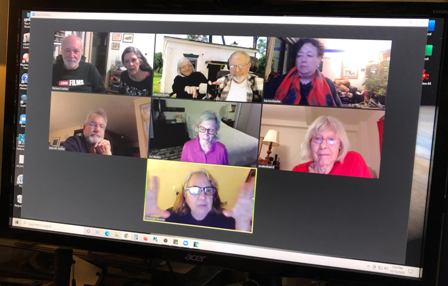
Whitehead, Colson (Brooklynite), Harlem Shuffle, 336 pages, 2021, Doubleday (paperback/Kindle/audiobook) (Finalist, Kirkus Award; in NYT Notable Books Of The Year; National Book Critics Circle Nominee; in WaPo Notable Fiction of the Year; in TIME Must Read Books of the Year; Best Books of the Year: NPR, Slate, Boston Globe, Town & Country, Vulture) (In discussing how much we love his use of language, as woven around a complicated plot within real events, we debated the use of words acceptable within African-American vernacular, but not by whites, and who are the readers of his books.) (1/10/2023)
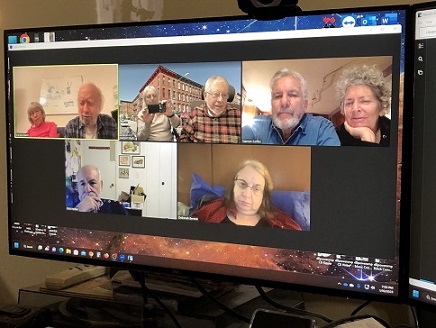
Whitehead, Colson (Brooklynite), Crook Manifesto, 336 pages, 2023, Doubleday (on Kindle, but not yet in regular paperback) (Though this book directly follows the story from his 2021 book, several members couldn’t get past the violence and cynical “roman à clef” portrayal of 1970s NYC, while the rest enjoyed the amusingly twisty plot machinations and connections between “crooked”, “bent”, and “straight” characters. (1/16/2024)
The TV series The Wire may have inspired this model for tracking the parallel bureaucracy and codes of conduct for crime and government institutions.
Wiesel, Elie (Romanian) in memoriam, The Night Trilogy: Night, Dawn, Day: Night, memoir originally published in French in 1955 as La Nuit, 148 pages, new translation by Marion Weisel (Oprah’s Book Club selection); Dawn, novel, originally published 1960, 100 pages, various translations; Day aka The Accident, novel, originally published 1961, 132 pages, various translations (While we saw the first, very moving book as the anchor, we had a vigorous debate about the moral philosophy of the second, with its eerie parallels to contemporary terrorism, and the somewhat confusing nihilism of the very male-oriented third.) (10/6/2016)
Oren Rudavsky’s 2024 bio-doc Elie Wiesel: Soul on Fire (to be broadcast on PBS American Masters series) points out that as Eliezer Wiesel he wrote a much longer, more detailed, angrier version of his memoir the year before in Yiddish. Un di velt hot geshvign (And the World Kept Silent) was published in Buenos Aires as Volume 117 in a series on “Dos poylisheyidntum (Polish Jewry)” that included several Holocaust memoirs. It was specifically intended for a Jewish audience, in the primary language of the dead. The French edition was aimed first at French Catholics, then to a broader audience with its English translation. (1/17/2025)
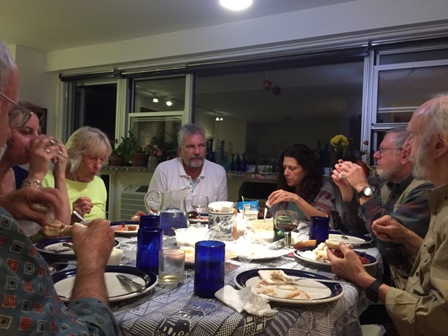 - Relieving stress of reading uncomfortable trilogy on the Lower East Side by feasting on Eastern European appetizing delicacies from Russ and Daughters.
- Relieving stress of reading uncomfortable trilogy on the Lower East Side by feasting on Eastern European appetizing delicacies from Russ and Daughters.
Wiggins, Marianne, Evidence of Things Unseen , 2003, 400 pages (We were all charmed by a sympathetic family saga of the Harry Truman generation that becomes an allegory about America's tragic faith in science and technology. The lovely love stories and the language withstood the obsessive references to Moby Dick.) (1/11/2005)
Our second pandemic Zoom meeting: 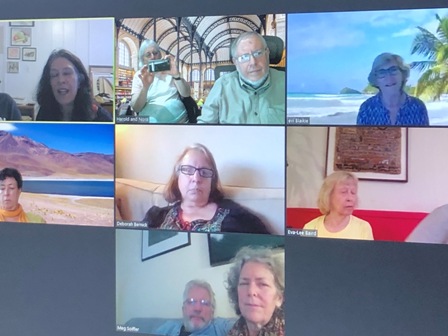
Wilson, Kevin, Nothing To See Here, 272 pages, 2019, Ecco (hardcover/Kindle/in audio read by Audie Best Female Narrator Marin Ireland; paperback will be released September 1) (Read with Jenna Today Show Book Club; Named a Best Book of Year by NYT Book Review; WaPo; People; Entertainment Weekly; USA Today; TIME; The A.V. Club; Buzzfeed; PopSugar) (Most quite liked the magical realism metaphor of fire for emotions of trauma in children as blended with a bit of political satire.) (6/2/2020)
Winton, Tim (Australian), The Riders, 1995, 384 pages (We still can't decide what the horses represent.)
Winton, Tim (Australian), Dirt Music: A Novel, 2002, 416 pages. There's also an accompanying 2 CD "riff" on the book with Winton's commentary on his music selections (scroll down). (Mixed vote on the likability of the main characters and the outcome of their triangle but all liked the use of language and evocation of a distinct place and culture.) (2/3/2004)
First meeting in Evi’s lovely new apartment: 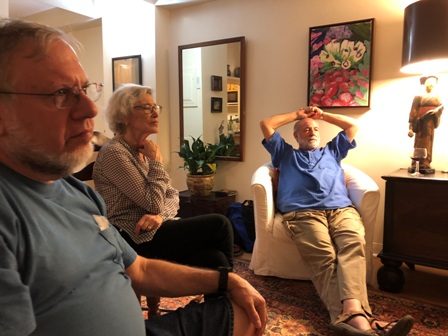
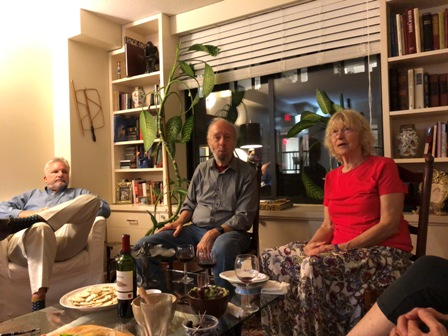
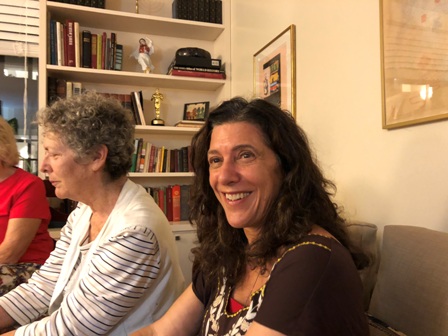
Woodson, Jacqueline (American), Another Brooklyn, 2016, 197 pages, HarperCollins’s Amistad Press (National Book Award finalist) (While we all appreciated the poetic language, most felt the strongest section of this autobiographical-memoir feeling story to be the childhood in Bushwick, weakening as the girls’ friendship loosened.) (10/2/2018)
Woolf, Virginia, Jacob’s Room, 175 pages (2/6/1996)
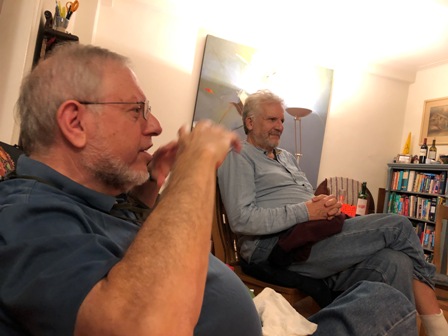
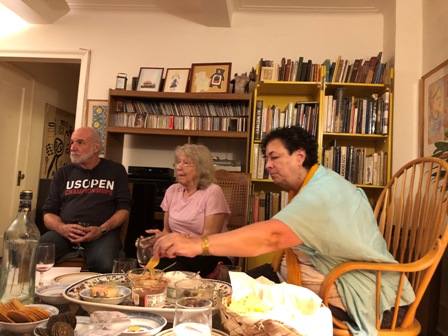
Wright, Alexis (member of the Waanyi nation of Australia), The Swan Book, 321 pages, 2016 in U.S. by Atria Books, paperback 2018 by Washington Sq Press, 2013 in Australia (also Kindle/audiobook) (shortlisted for: Victorian Premier's Literary Award for Indigenous Writing; Stella Prize for Australian women; Miles Franklin Literary Award for "a novel which is of the highest literary merit and presents Australian life in any of its phases”; New South Wales Premier’s Christina Stead Prize for Fiction; Winner- Australian Literature Society Gold Medal and Kate Challis RAKA Award to Indigenous Australian creative artist) (This Reporter was the only one who liked the book – even among the few who finished it – most found the dystopian allegory too dense, the references too obscure, the metaphors inconsistent, the story confusing, and the conclusion unfulfilling.) (10/12/2021)
Yalom, Irvin D., When Nietzsche Wept (Well, if you want to read about a philosopher.)
Yehoshua, A.B. (Israeli), The Liberated Bride (somewhat awkwardly translated by Hillel Hankin), 2003, 576 pages (Even with an obnoxious narrator, we all enjoyed the satirical vignettes, some that were very funny, though we were split on interpretations of the dysfunctional family elements and political allegories such that we weren't sure the book as a whole hung together.) (4/18/2006)
Yu, Charles (Taiwanese-American), Interior Chinatown, 288 pages in paperback (also in Kindle and audiobook), Pantheon, 2020 (National Book Award; longlisted for Carnegie Medal Finalist for Excellence in Fiction) (While we thought the central movie/TV script metaphor was clever, some thought it got strained towards the end, but we had a lively discussion on American racism towards Chinese and other Asians, historically, from our childhoods, to now.)
Zabor, Rafi, The Bear Comes Home, 1998, 484 pages (We spent most of the lively discussion--to the sounds of jazz CDs-- on the first question: "Why a bear?" Is he a metaphor? a literary device? really a man?)
We mourn the passing of Bill Lavner, who for years attended and genially hosted Book Club meetings thoroughly prepared to discuss our books enthusiastically, despite great physical difficulty and travel challenges. We miss his humor, insights, reading suggestions, and dedication. May peace be upon him.
To the Mandel Maven's Nest
Comments, corrections, additions, questions welcome! Contact Nora Lee Mandel at mandelshultz@yahoo.com
Hold a book in your hand and you’re a pilgrim at the gates of a new city.
--attributed as a Hebrew saying by Anne Michaels in Fugitive Pieces
Copyright (c) 2026
 (seen at 2022 First Look Festival at Museum of the Moving Image/ courtesy of Icarus/dGenerate Films) (3/20/2022)
(seen at 2022 First Look Festival at Museum of the Moving Image/ courtesy of Icarus/dGenerate Films) (3/20/2022)






